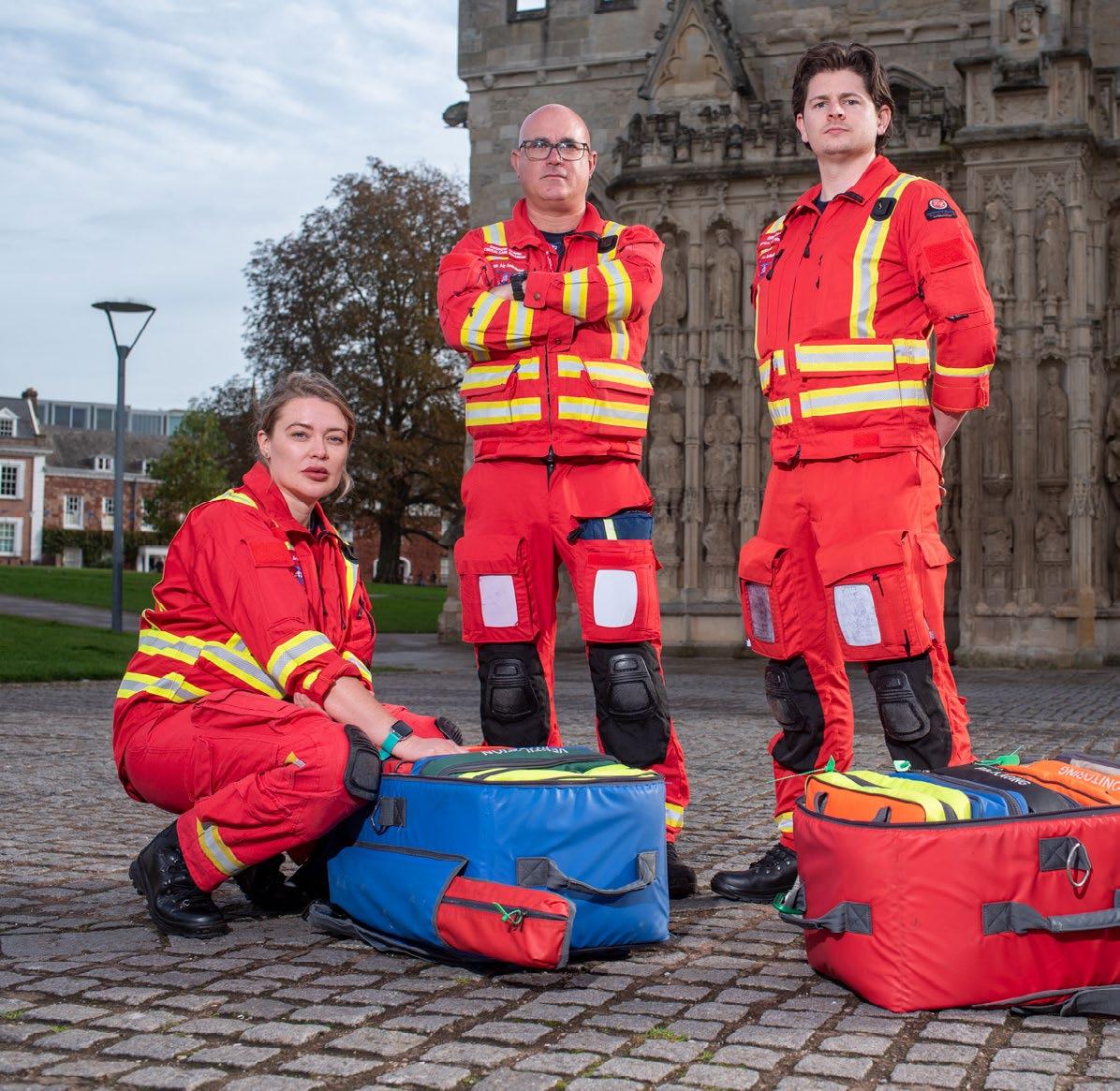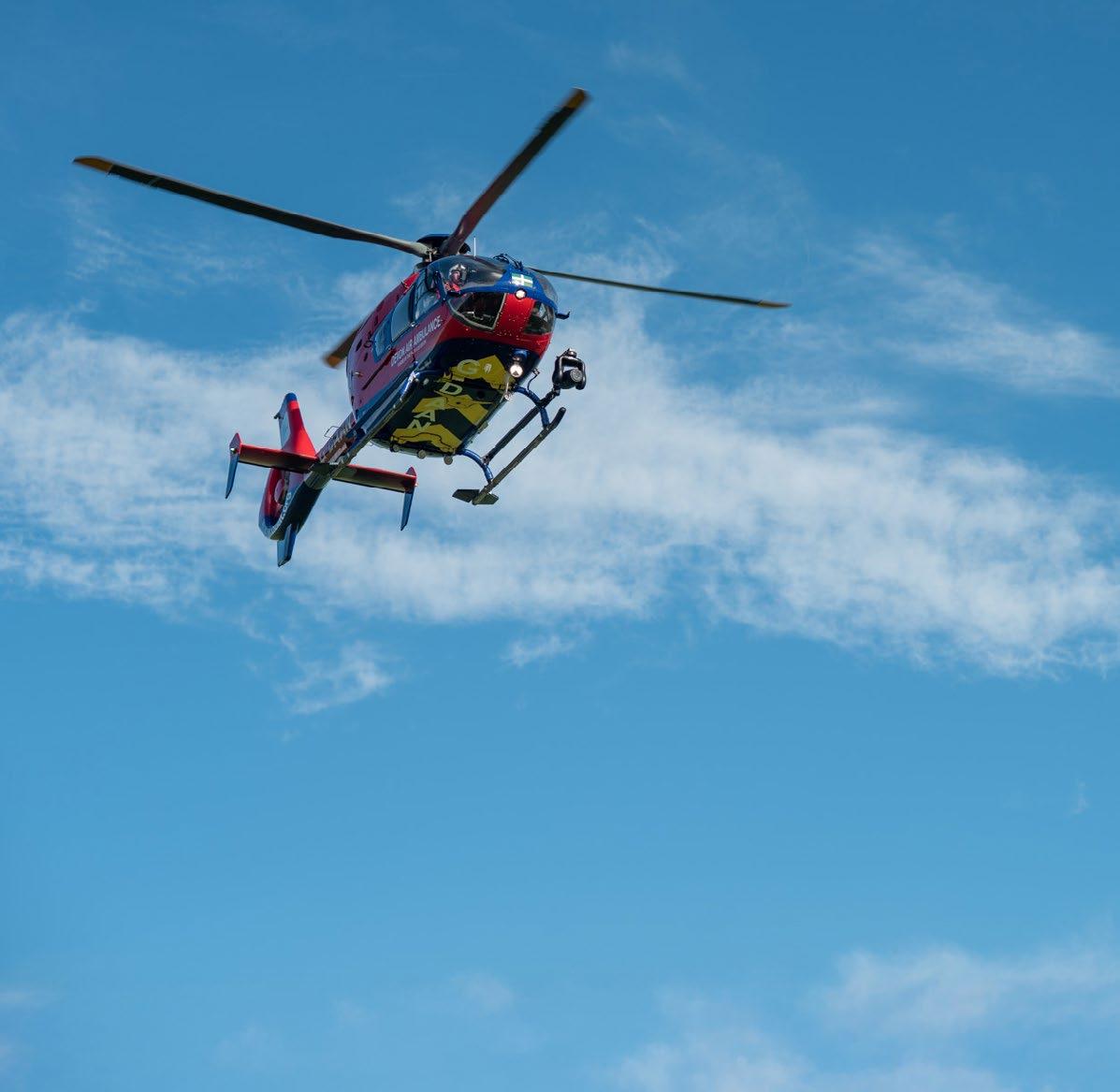
1st January 2024 to 31st December 2024


1st January 2024 to 31st December 2024
Digital
Future
Review
Financial
Financial
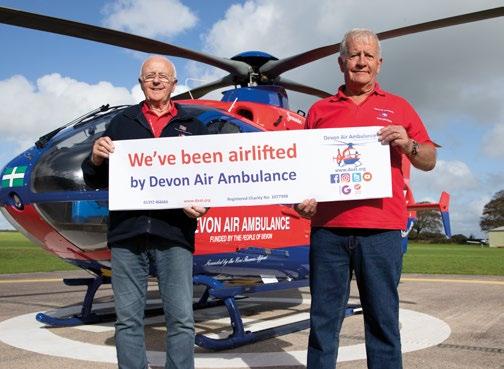
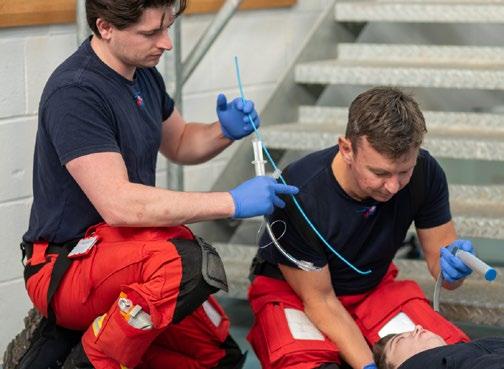
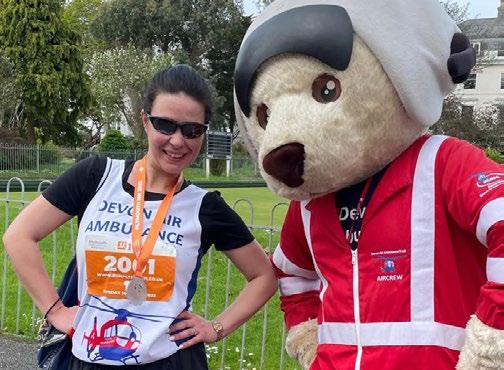



I have joined the charity as CEO after 17 years of Heléna Holt being at the helm. I would like to thank Heléna for handing over the organisation in exceptionally good shape, whilst also expressing my excitement at the opportunity to build on her legacy.
I am immensely grateful to the people of Devon for their ongoing support of the Charity. Without this support, we simply would not be able to operate.
We are proud of our independence, and I am proud of every one of our multi-professional team and volunteers, who work tirelessly to meet the increasing demand on our helicopter and critical care car services, saving lives.
The external operating environment remains challenging, and yet I am pleased to report strong financial figures for this year. The overall financial surplus is due to high income from legacies despite more activity at higher costs. Looking forward we do not expect legacy income to be as high and there to be a deficit. This shows the impact on wills and legacies and their importance combined with wider fundraising donations. We have been fortunate to receive some significant financial legacies, which demonstrates the importance of Wills and legacies alongside wider fundraising and donations.
Looking forward, we have exciting plans to build a new airbase and headquarters, allowing us to develop and increase our service further and save more lives. It also allows us to future proof the organisation supporting our use of digital and providing a platform for knowledge, education, support and funding donations - this will all combine to offer the best service for the people of Devon.

Devon Air Ambulance Trust is the charity that raises the funds needed to provide a free emergency medical service to anyone in Devon and its neighbouring counties when they need it most.
We operate two helicopters (one EC135 and one larger H145) all year round from airbases in Exeter and Eaglescott, North Devon. Both aircraft are capable of night flying and the aircraft operating out of the Exeter Airbase is operational between the hours of 7am and 2am – a total of 19 hours a day.
To ensure we respond most effectively, every deployment is assessed against specific criteria in terms of clinical need, urgency, accessibility and distance to the hospital that is most appropriate to treat the illness or injury of the patient. This work is also supported on land by our fleet of four critical care cars, with two cars ready to respond at each airbase, every day of the week.
We are proud of our independence, which is only possible thanks to the loyal support we receive from the local communities who fund our service by supporting our shops, as well as through their fundraising efforts, playing our charity lottery, donations, gifts in Wills and corporate fundraising activities. The benefit of being financially independent means we can make long-term plans for our service based solely on local needs and priorities.
We are accountable to the public we serve. Our Trustees comply with their duties in accordance with the Charities Act and the Charity Commission’s guidance on public benefit, exercising their powers and duties in all aspects of the organisation’s activities.

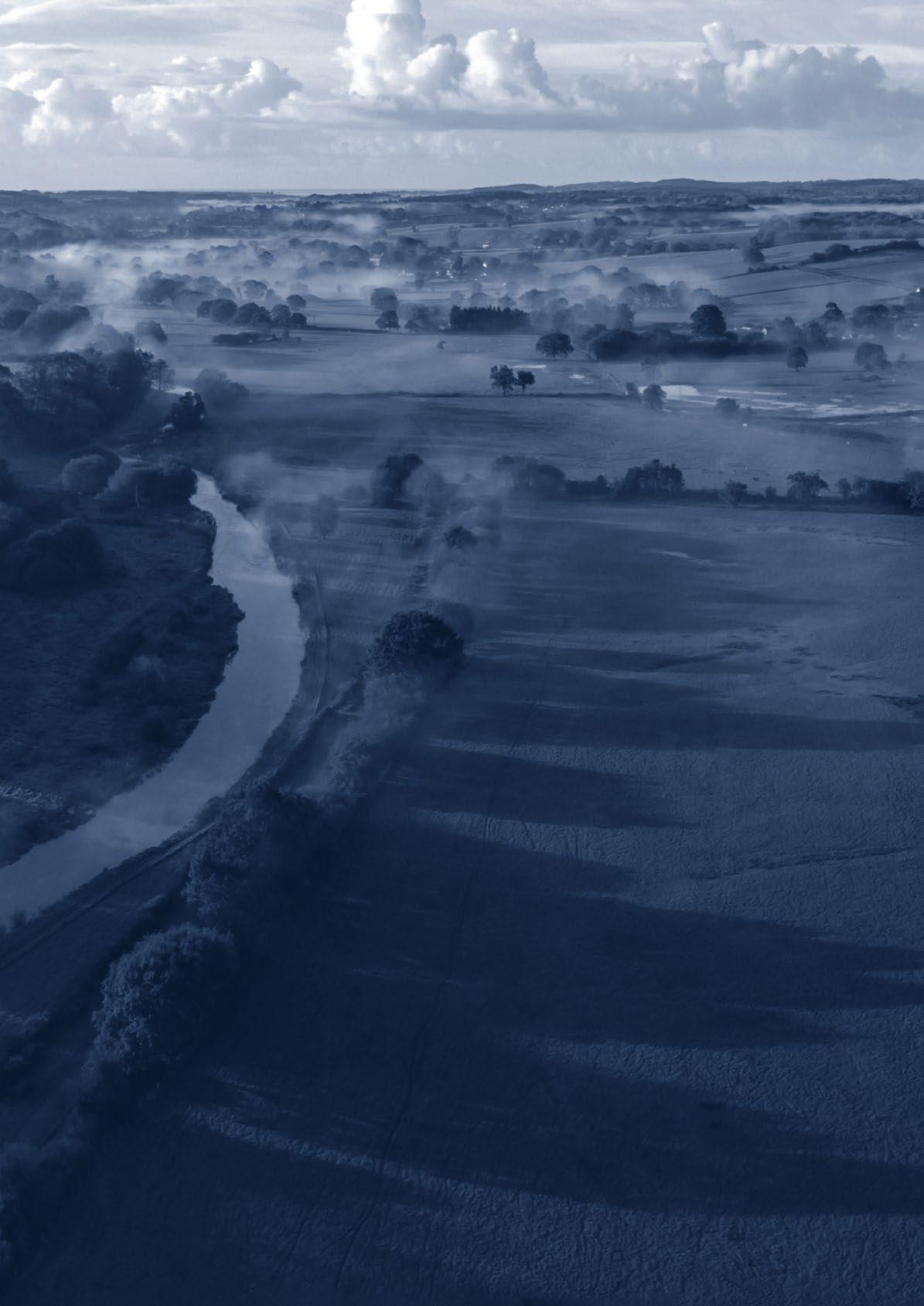
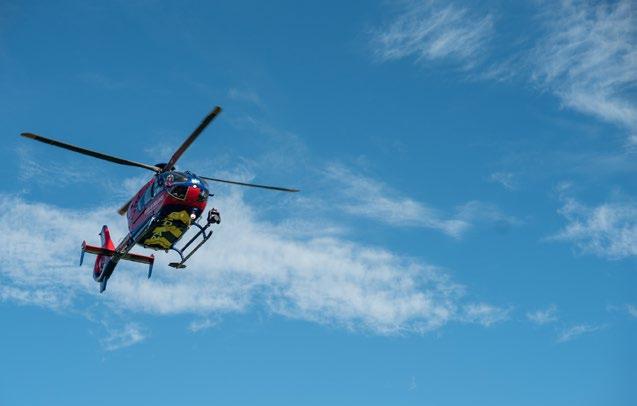
Our values set out the qualities and behaviours we aspire towards as an organisation and they underpin everything that we do.
Because it matters that colleagues come to work with a sense of drive, purpose and curiosity.
Because exploring the future inspires us.
Our commitment to teamwork, diversity and inclusion enable us to build strong networks and achieve more for our community.
Our Vision
To end preventable death, disability and suffering from critical illness and injury.
Our Mission
To transform time-critical care through prevention, treatment and recovery.
- The relief of sickness and injury primarily in the county of Devon through the provision of emergency medical services and equipment by helicopter or other emergency vehicles.
- The advancement of health through provision of training, research and education in the field of pre-hospital emergency medicine and treatment or prevention of sickness and injury.
- The provisions of other health related services including aftercare of patients.

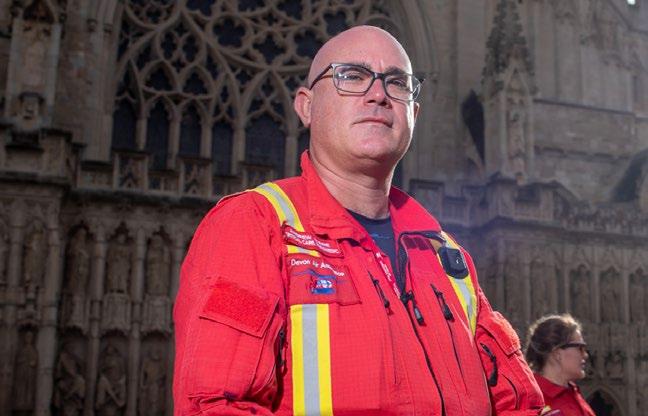
To support our mission and work towards our vision we have three key aims to deliver our service:
• Increase survival rates from out-of-hospital cardiac arrests (OHCA)
• Improve survival rates following road traffic collisions (RTCs)
• Broaden our impact through outreach and education initiatives

• Increase our service delivery
• Increase the scope of our practice
• Maximise our availability
• Offer tailored support for all our patients
• Offer a peer-support programme
• Establish a memorial garden and visitors’ centre
2023 trends have continued, with the Charity seeing a record number of patients.
Higher costs have created financial pressure, but record legacy income has generated a surplus. This included a single large legacy and delayed probate processes.
Delays in receiving cash from legacies have led to a cash outflow and the need to draw from investments.
The increase in missions and patients treated highlights the Charity’s crucial role in providing critical care in Devon.
The surplus was significantly ahead of the budgeted deficit, mainly due to higher-than-expected legacy income.
Despite the surplus, an underlying operating deficit is expected to continue in the medium term as the income generation strategy is implemented.
Solid levels of cash and investments provide stability against economic volatility and support strategic development, such as a new airbase and office facility.
A new digital strategy has been implemented, including a restructure to grow the digital team, supporting the Charity's overall development.
The Charity expects continued financial pressure in the short term but remains focused on its mission of prevention, treatment, and recovery. The plans for the new combined airbase and head office continue to progress with realistic expectations that building will start at the beginning of 2026.
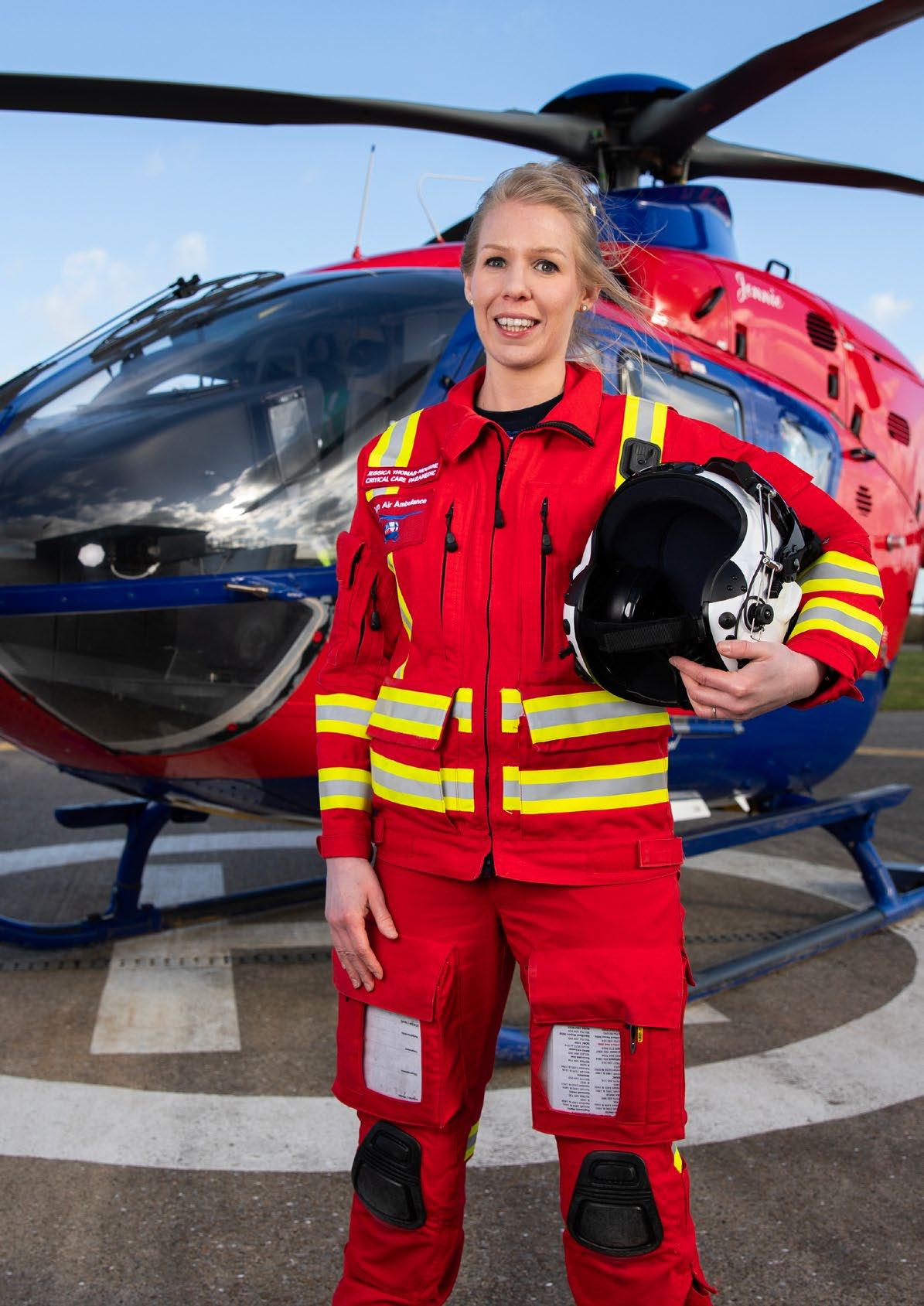
As demand for our service continues to rise, here are some of the top-line statistics that illustrate our year in numbers.

2,459 total missions air & land
1,252 trauma incidents
1,187 medical incidents day of the week month of the year
busiest Sunday June busiest
In 2024 we assisted
1,254 helicopter missions
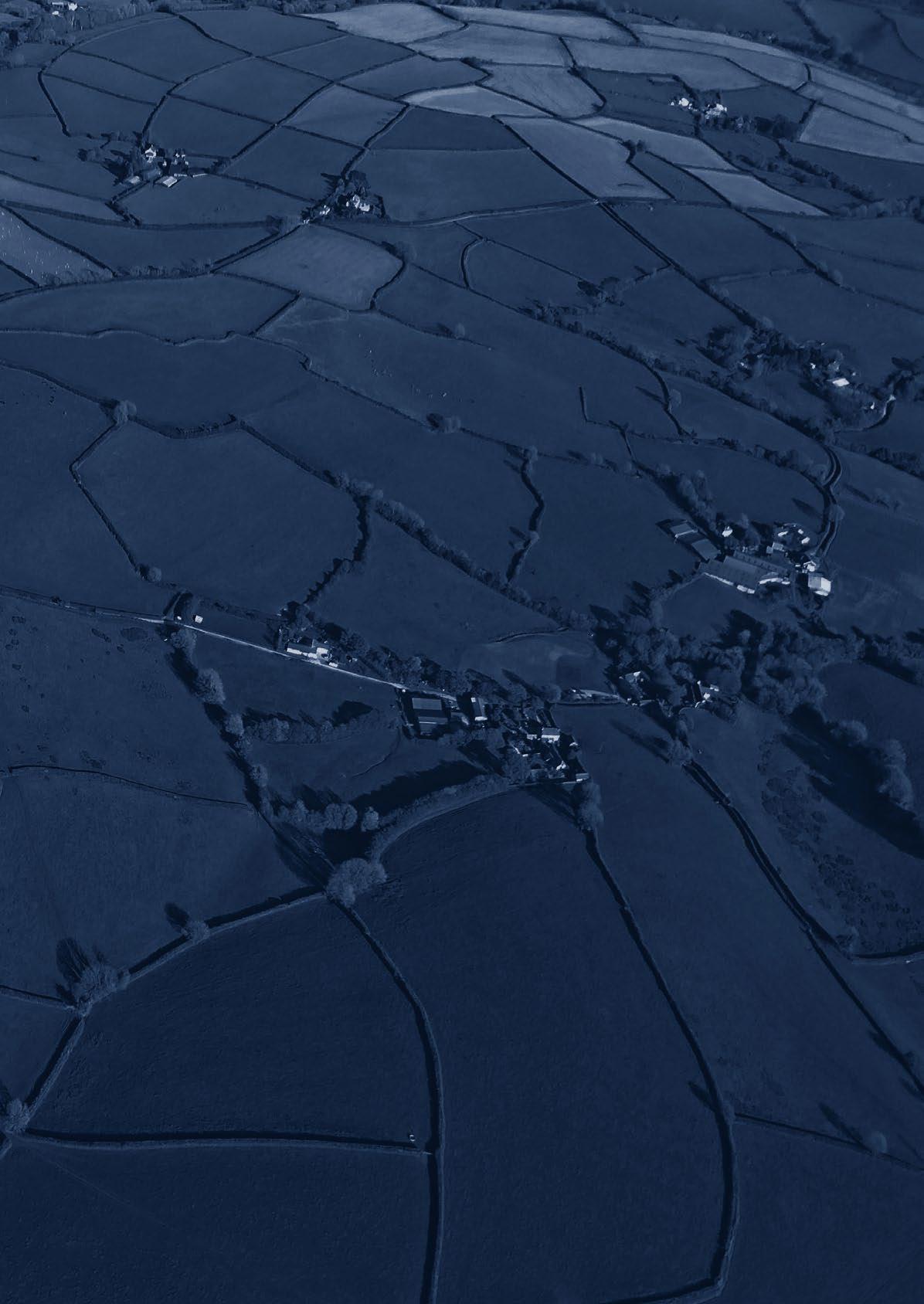
1,104 critical care car missions
442 night missions
101 volunteer responder missions
855 adults
381 70+ 164 children
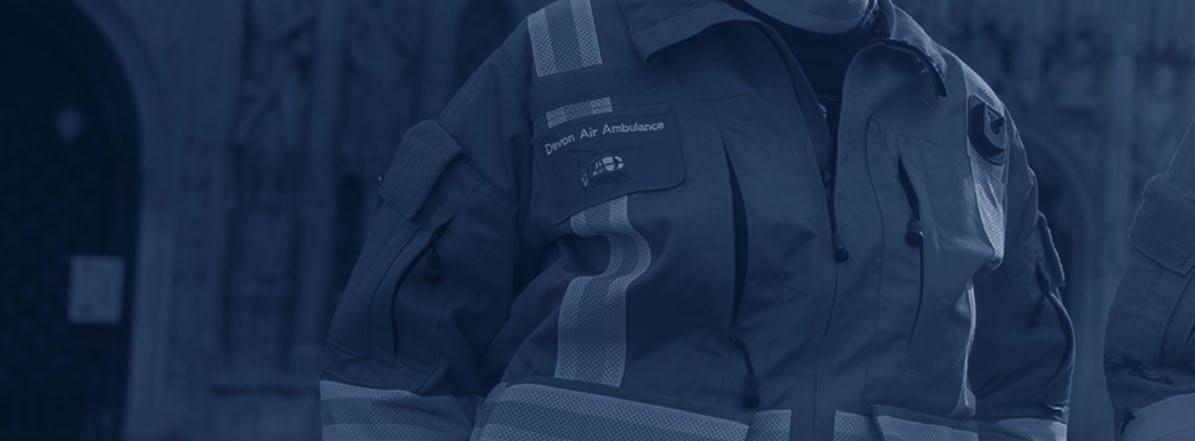
We are proud to work with IMPACT, a new and important part of Devon Air Ambulance. This unique collaboration enables us to harness expertise, resources, and support across the organisation to advance the care of those affected by road injury. Together, we drive innovation, conduct pioneering research, and translate our findings into tangible improvements in post-collision care, ensuring better outcomes for patients and their families.
IMPACT embodies and extends the values and vision of Devon Air Ambulance to transform lives through groundbreaking work in this vital field.


Cardiac arrest remains a critical focus, affecting over 30,000 individuals annually in the UK, with fewer than one in ten surviving. Throughout 2024, we delivered our ‘Help With All Your Heart’ campaign, training over 1500 individuals in CPR and defibrillator use, equipping them with the confidence and skills to intervene effectively in emergencies.
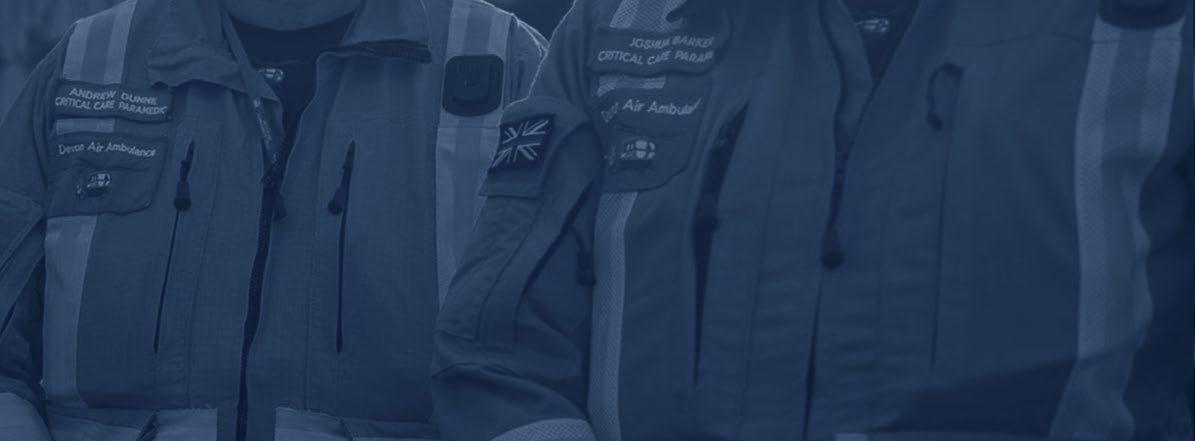

Our outreach efforts continue to play a key role in prevention, enhancing direct knowledge and indirectly raising public awareness and standards of emergency care. Over the past year, we dedicated more than 1,000 hours to education and engagement activities. This included: Basic Life Support and AED training sessions for the general public; Training sessions for emergency services personnel; Support for preventative campaigns such as “Learn to Live” and “Doc Bike”; Educational sessions for ambulance staff and paramedic students; Engagement activities with armed forces medics; School visits to raise awareness of Devon Air Ambulance services. Through these activities, we aim to continuously improve public preparedness and responsiveness in emergency situations, ultimately saving more lives.
We continued our active collaboration with Vision Zero South West, a multi-agency partnership aiming to eliminate deaths and serious injuries from road traffic incidents by 2040, with a near-term target of a 50% reduction by 2030. Partners include Devon & Cornwall Police, regional fire services, South Western Ambulance Service, National Highways, local councils, NHS Trusts, the Office of the Police and Crime Commissioner, and the Parliamentary Advisory Council for Transport Safety.
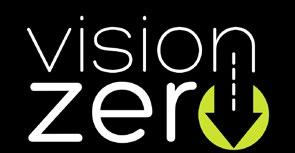
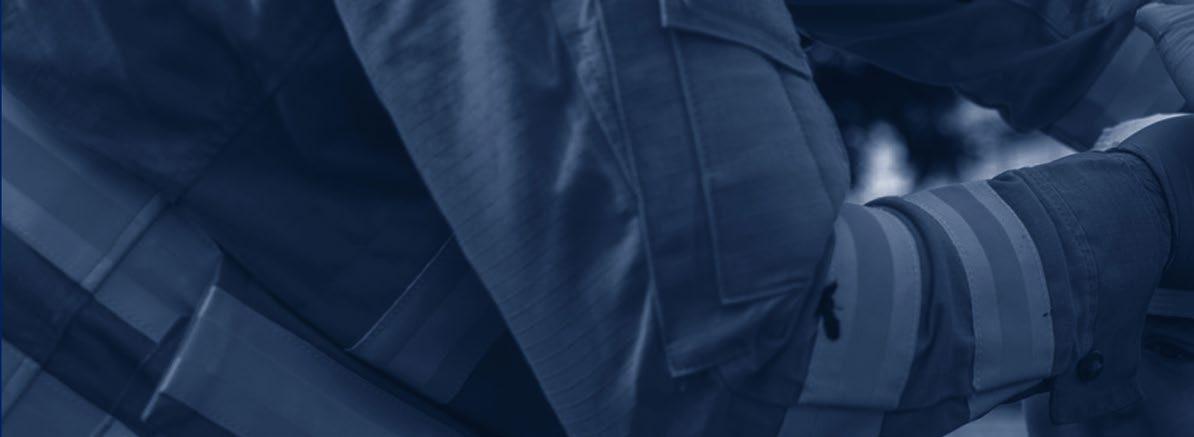
Delivering advanced, time-critical care to patients suffering from life-threatening medical conditions or serious injuries and transporting them to the right specialist treatment centres is at the heart of our service. Our aircraft are crucial for delivering clinical crews to patients and transporting them when necessary. Our critical care cars allow us to reach some patients more quickly based on their location and are available when helicopters cannot be used due to severe weather or mechanical issues.
2024 was a busy year for us, with an increase in both deployments and the number of patients we treated. We have seen a steady rise in deployments since 2019. This year, we were deployed 2,459 times— a 10% increase from 2023. From these deployments, we treated 1,403 patients, surpassing our previous record and demonstrating the critical importance of our service to the people of Devon.
“The severity of the injuries and illnesses we deal with has also risen, necessitating changes in our
structure”
Ensuring the highest quality of care is paramount when attending to patients. The Care Quality Commission (CQC) regulates our service, and their most recent comprehensive inspection in 2022 rated us as ‘Outstanding’— the highest possible award. We continue to uphold these high standards, confident that our patients receive the best care possible.
The pattern of our work has also evolved. Historically, we saw a clear summer spike in activity, but this spike has now broadened. We have adapted by refining our working methods to meet the increased demand. The severity of the injuries and illnesses we deal with has also risen, necessitating changes in our team structure to ensure we can handle the new volumes and patterns of work effectively.

Our Volunteer Responder Scheme saw 101 deployments this year, building on the 79 from the previous year. This scheme allows paramedics equipped with life-saving medical equipment to volunteer their time, responding to patients with enhanced care needs when our duty teams are already committed or when they can reach a patient more quickly. This initiative reflects the passion and dedication of our clinicians.
“This initiative reflects the passion and dedication of our clinicians”
Critical Care Cars were deployed 1,104 times, up from 814 the previous year. This increase aligns with the greater flexibility in deployment methods adopted in 2022, allowing us to reach more patients. The trial of an additional Critical Care Car with a single paramedic, which continued into 2024, demonstrated the ability to treat more patients and reinforced the importance of having a second Devon Air Ambulance resource. As a result, our daily Critical Care Car response has been incorporated into our core service provision and was dispatched 438 times in 2024.
In 2024, we conducted 1,254 deployments using our two aircraft, seeing a small decrease in missions from 1,333 in 2023. These aircraft are essential to our service, and the Flight Operations team has been crucial in maintaining high service quality.
Monitoring helicopter performance is critical, but having two different aircraft types poses training challenges and general inefficiencies. Replacing an aircraft is costly, especially in a challenging financial environment, and the timing and approach for the next aircraft replacement remains under review at the year-end. Recruiting skilled pilots remains challenging, and operating two aircraft types increases training demands. Recruitment efforts will continue into 2025, with retention and recruitment expected to remain difficult due to a limited inflow of qualified staff.
Ensuring our team is fully resourced to maintain high service standards remains a key focus for the coming year. We will continue to explore future development opportunities, including the potential of drones and addressing our aircraft needs in the short, medium, and long term.
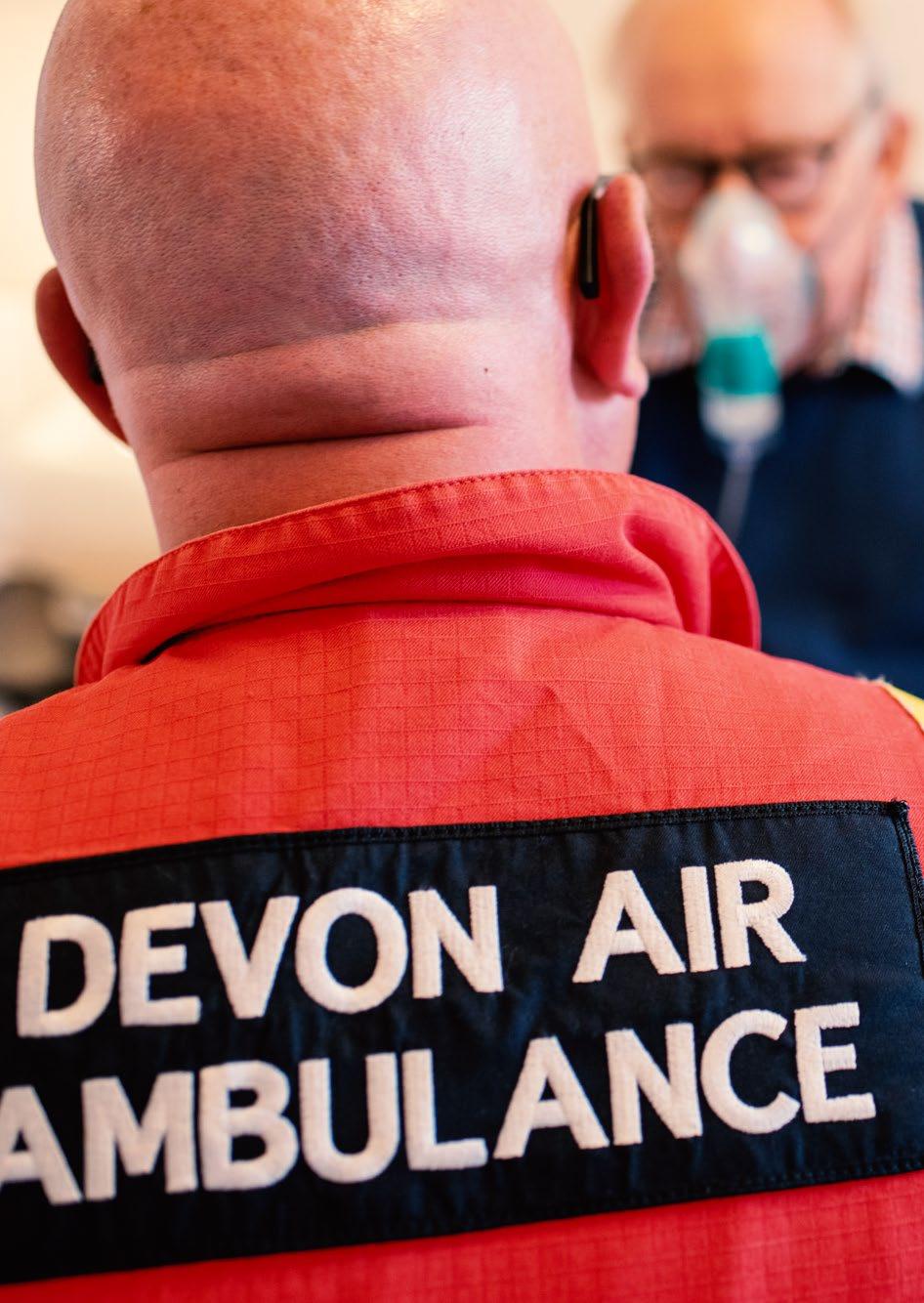
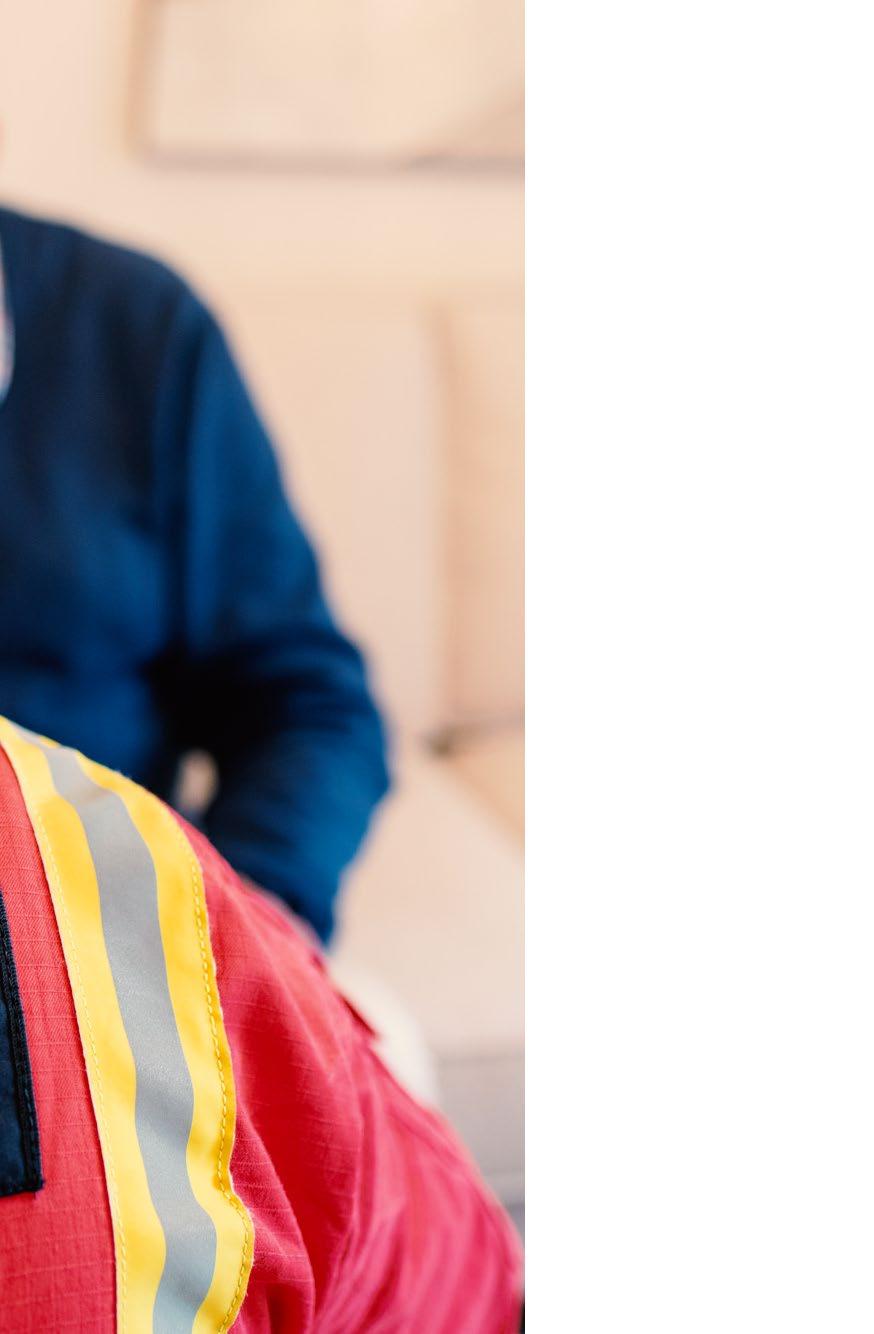
Our commitment to patient care extends beyond initial treatment, with our Patient and Family Support Team playing a crucial role since our move to clinical independence.
This team offers tailored support to patients, their families, and good Samaritans who assist at the scene. They also connect them with other charities and agencies for more focused or ongoing support.
Supporting our patients’ recovery involves giving them information about the care they received, the reasons behind it, and why some were transferred to specialist hospitals rather than the nearest ones. This transparency is essential for both patient understanding and clinician learning.
By understanding our patients’ experiences, we continually improve the care we provide, enhancing their overall experience.
With the increasing number of patients we treat, there has been a corresponding rise in demand for our Patient and Family Support Team’s services. It has been both humbling and encouraging to see more patients and their families contacting us to express their gratitude and share their experiences with us. This feedback is invaluable as it helps us continually refine and enhance our support services.
To meet our aims, we have a clear strategy how to get there. Our strategy has evolved to become more agile and flexible, reflecting our rapidly-changing environment.
By recognising what we want to achieve short-term as well as more strategic and long-term targets that are reviewed annually, we aim to have a structured but adaptive approach.
To meet our three key aims and work towards our vision, we have identified five focus areas to drive us towards our mission. Each focus area has been considered in the following timeframes: tactical (1-2 years), strategic (2-5 years), visionary (5-10 years) and ‘over the horizon’ (10+ years).
To fund our service and fuel our ambition through growth, engagement and efficiency.
See page 22

Talent & Culture
To attract, train and retain exceptional people by being a world-class organisation people want to work for.
See page 30
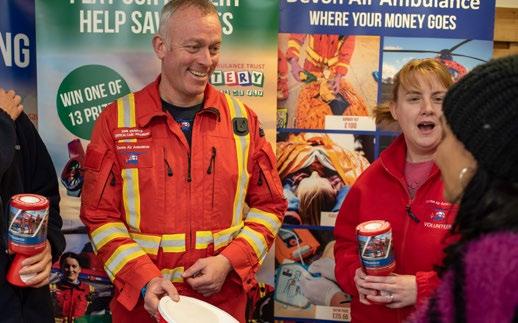
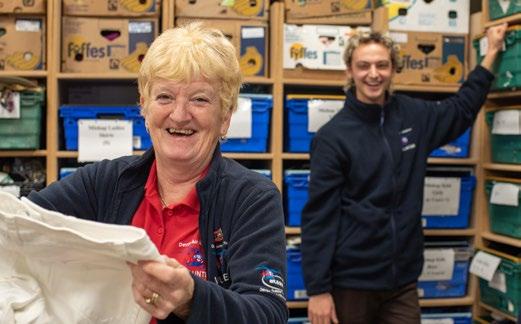
Stewardship of our environment, community impact and healthy future.
See page 38

Harness our data and technology to support innovation, operations and collaboration.
See page 40
Innovative multi-purpose resource empowering us to deliver. A medium term objective which is crucial to achieve the other areas as well as the aims.
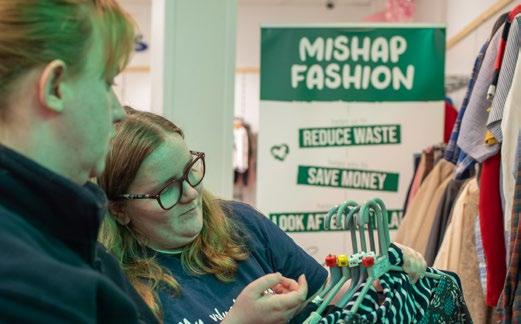
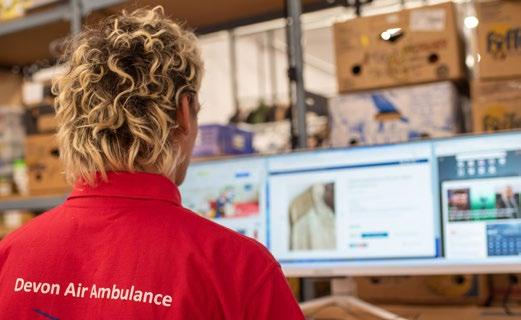

See page 42
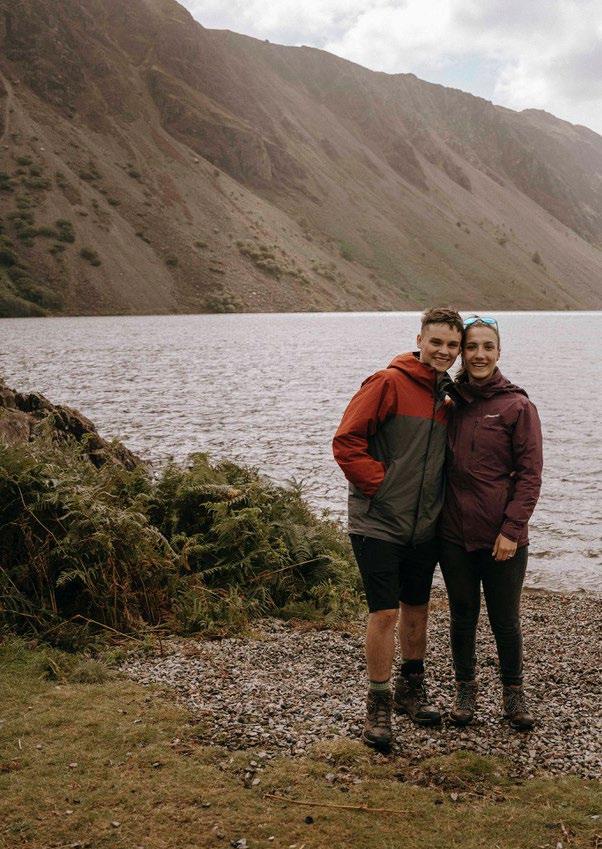

A lorry travelling in front of Sam stopped suddenly, causing the driver of Sam’s vehicle to swerve. Unfortunately, Sam’s passenger side made a significant impact with the lorry and, due to the extensive damage, the air bags failed to deploy. Sam was trapped in the vehicle. He said: ‘I remember seeing my foot somewhere near my waist, but, since the accident, I have visited the fire crew who said my leg was pinned up and my foot was actually near my shoulder!’
Due to the severity of the accident, three fire crews from Newton Abbot, Paignton and Torquay were dispatched to the scene and were tasked with separating the two vehicles before they could begin to free Sam from the wreckage.
Enhanced services required It was quickly evident to the emergency services on the scene that this serious incident required the expertise of the Devon Air Ambulance (DAA) Critical Care crew.

‘The relief on Sam’s face when he saw me was the minute that he knew he was getting the help he needed and he was going to be ok! I said goodbye and told him I’d meet him there but he couldn’t communicate with me, it was so scary.’
Once DAA’s crew had assessed Sam, he was given Ketamine for the pain and stabilised ready to be conveyed to the closest Major Trauma Centre, Derriford Hospital in Plymouth.
Sam was immediately rushed into 9 and a half hours of surgery to repair the internal injuries sustained and then he remained on the intensive care unit in an induced coma for 4 days. In this time he had more surgery to repair the breaks to his arms and legs.
“I said goodbye and told him I’d meet him there but he couldn’t communicate with me, it was so scary”
In this time, Sam had asked his boss to call his girlfriend Maddy and let her know what was happening. It was also Maddy’s 23rd birthday that day.
Maddy was in Totnes at the time but recalls getting the harrowing phone call and rushing to be with Sam. She said: ‘I was on the scene within 20 minutes, I just wanted to let him know that I was there, and it was going to be OK, even though I didn’t know that for sure myself.’ Maddy remembers hearing the DAA helicopter landing on scene as she parked her car and made her own way to the scene.
A new normal for Maddy and Sam Once Sam was discharged from hospital, Maddy gave up her job to move in with Sam and his family becoming his full-time carer while he faced the long road to recovery.
Over the summer Sam & Maddy finally got away for a break together for belated birthday celebrations. They visited the lake district where they got engaged on 22 August 2024.
Sam’s family held a Quiz Night in aid of DAA by way of saying thank you and Sam’s stepdad Judd said: ‘It became apparent that if it wasn’t for the speed of Devon Air Ambulance attending, there is a very real possibility that Sam’s life would have been lost’. The family have raised over £4,000 for DAA so far.
Our ambition is to fund our service and fuel our ambition through growth, engagement and efficiency.
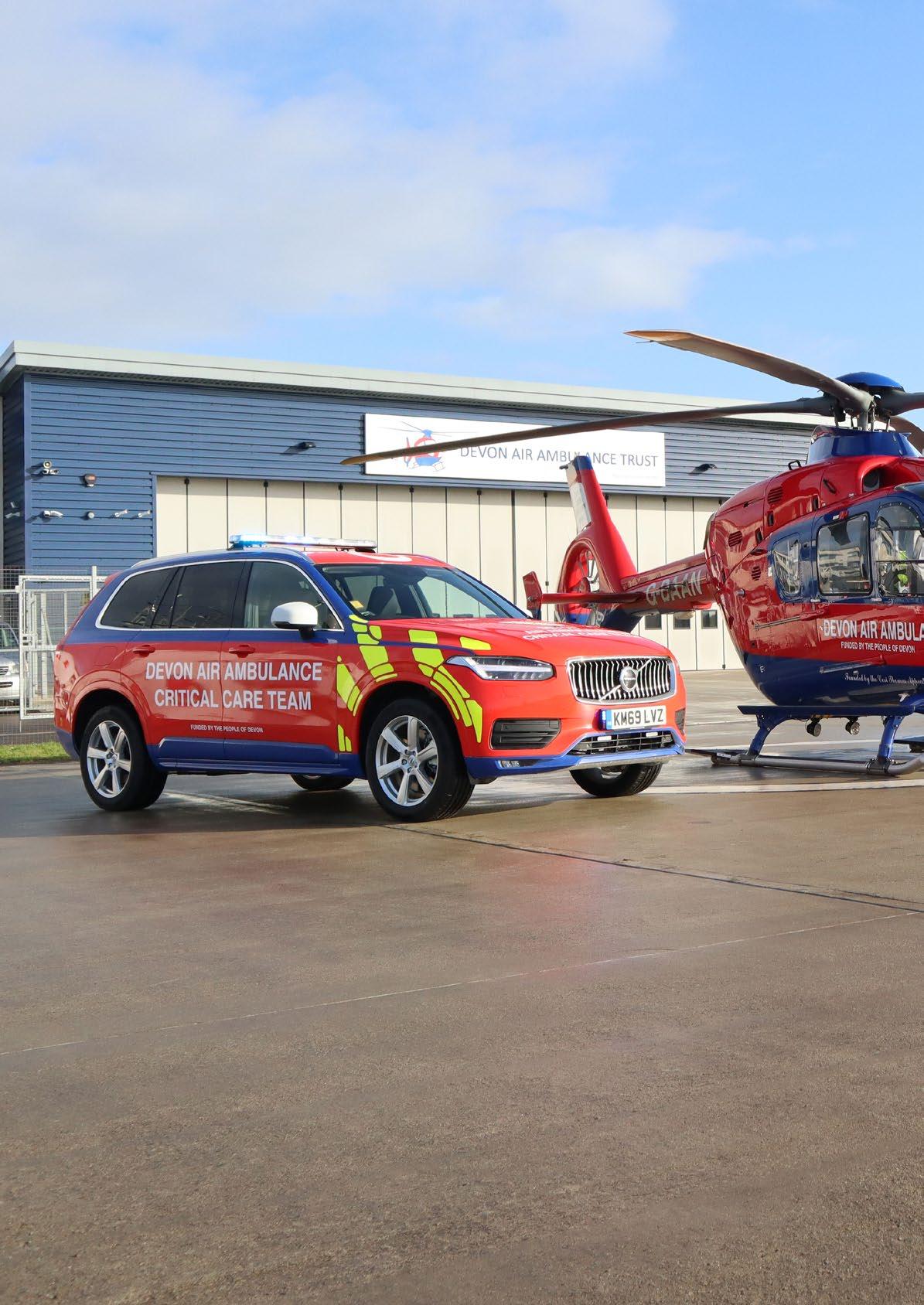
A significant deficit of approximately £2 million was expected in 2024 but once again income generated from legacies exceeded expectations, reaching a record £8.4 million and resulting in a surplus of £1.4 million. Legacy income was £3.94 million above the £4.5 million budget figure, reflecting an increase of 128% on the prior year and included a single legacy of £2.95 million. This continues to demonstrate the variability of the Charity’s largest income stream which drives the annual results, making financial results difficult to predict. This will be particularly true looking forwards due to the significant investment in the new building and the related income which is expected to be raised to support it.
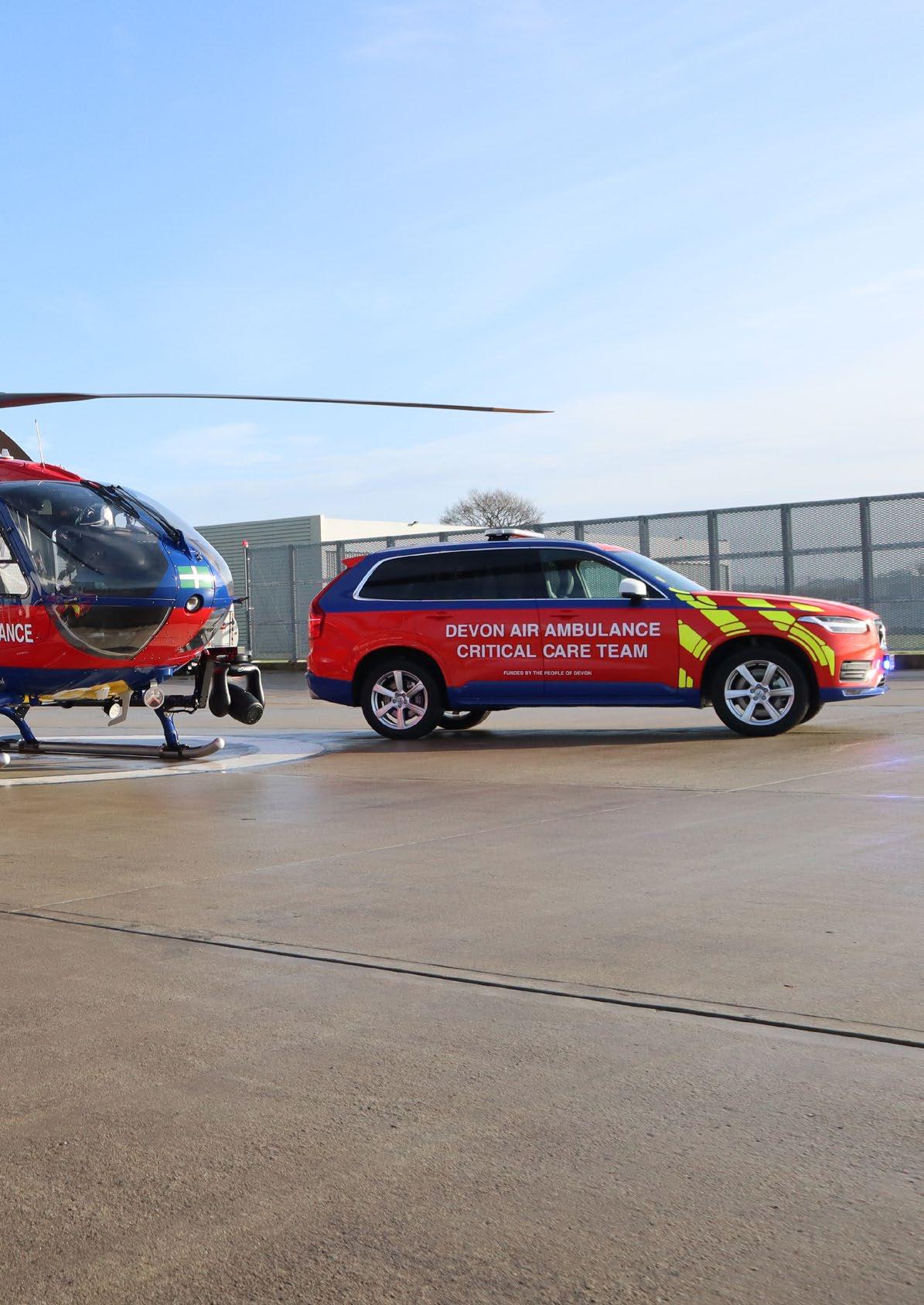
“once again, income generated from legacies exceeded expectations”
Growth to provide sustainable year on year growth in net income to cover the costs of our operational plans.
Engagement through our local communities to ensure support and understanding of our service.
Efficiency a continuing improvement in efficiencies to make the absolute most of the money provided by our supporters.
In 2024, we continued work to increase income from fundraising and retail. This work has advanced in many areas with much progress made. But new income streams take time to establish and mature, and we have faced a number of internal and external challenges in year, including recruiting to key roles, securing new retail sites, retaining and growing the number of lottery canvassers, and wider financial pressures on household incomes.
Despite the challenges, we have trialled several new fundraising initiatives, including a summer raffle and new abseil event –both of which were a success. We have also replaced our outdated fundraising CRM database, providing valuable insights to support our income generation and improve the donor experience.
To support our efforts to raise the profile of Devon Air Ambulance, we refreshed our brand visual identity in the year, with a new-look logo, strapline and
visual style introduced. We also replaced our website with a new site which better integrates with our other systems, creating efficiencies and a better user experience.
The expected deficit of £2 million was more than covered by £8.4 million of legacy income exceeding budget by £3.94 million, generating a surplus of £1.4 million. The results for the year also included investment gains of £352,000 on investments held.
At the end of 2023 we were aware of a significant estate from which we were due a share of approximately £2.9 million but which had not progressed through the probate process at the time. Following probate this has now been included in our figures and is a major reason
for legacy income increasing by 128% to a record high of £8.4 million. The backlog of estates going through probate at HMCTS was decreased in the year resulting in a record number of probate applications being issued, which also supported a strong year for legacy income. This high level of income is therefore not expected to be sustained in the short to medium term.
While this has been the key factor in the Charity making a surplus in the year, not all of this has been received as cash and the debtor has increased from a record high of £3.6 million to £8.3 million. This has resulted in draw downs from investments in the year of £3.2 million to support the Charity’s ongoing activities.
Lottery income is an important revenue stream due to its

recurring nature and relative stability – further growth will generate not just immediate income but further income in future years. Membership growth was slow in the first part of the year but partially recovered with membership slightly shrinking overall from 47,932 to 47,601.
The continuing national shortage of canvassers to signup sufficient new members to not only sustain the current numbers but also generate growth was a major factor in income of £2,457,000 being 14% behind budget, but this was still £54,000 above the prior year which started with lower member numbers at the start of 2023. Less sign-ups also resulted in less costs, so the contribution of £1,744,000 remained significant and within £2,000 of last year’s figure.
In 2024, we introduced two new community products: ‘Bake Off for Take Off’, encouraging individuals, groups and
businesses to get baking for Devon Air Ambulance, and our own ‘Pub Quiz’, providing local venues with a ready to use quiz to raise vital funds.
We also continued to support individuals running for us in the Plymouth, Exeter and Torbay Half Marathons.
We saw the return of Devon Air Ambulance organised events, with our Plymouth Abseil. This event was kindly supported by the Royal Marines and involved brave participants abseiling down the walls of the citadel, which raised a fantastic £25,000.
We have plans to significantly grow events in 2025, with the introduction of Devon Heli Hike, a 14 or 26 mile walk along the South West Coast Path, and a fun Inflatable 5k.
We continued to develop our individual giving programme with the introduction of a prize raffle draw. The mailing raised £40,000 and brought over 2,000 new supporters to the charity. We also ran another successful Christmas appeal, raising a little under £65,000.
Support from local businesses remains an important part of our fundraising mix, raising both vital funds and our profile with many different people. The year was not without its challenges as our Dragon Boat race, always popular with businesses, had to be cancelled due to bad weather. So too was a planned race day with the Jockey Club at Exeter Racecourse. We are grateful for the ongoing support of the Devon business community and have plans to continue developing new relationships in 2025.

Retail sites allow us to engage with our community, fostering collaboration and support across Devon.
Conditions have been challenging for the retail shops with a background of rising costs and cost of living pressures, but growth has continued with sales increasing from £2.6 million to £2.7 million. This was supported by a new shop opening in Crediton in September while another new shop in Paignton opened at the end of the year to take us to 22 shops to support this growth in 2025 and beyond.
In 2024 retail generated a loss of £86,000 (£119,000 profit in 2023) which was after a significant £359,000 (£239,000 in 2023) contribution to overheads. It’s the first time we have met the objective of opening two shops in the year (just!) since the pandemic, with further opportunities identified for 2025 to move towards our target of 30 shops by 2030, which is expected to return us to a profitable position.
As well as generating income the retail shops carry-out a vital role for the Charity, ensuring that we are visible and present in the communities which we serve. The shops help support local fundraising and awareness as well as offering a fantastic opportunity for our volunteers to be regularly involved. These volunteers as well as the staff are crucial in maintaining faceto-face contact with our supporters in their communities. The presence of the shops also helps support our other income streams such as income from legacies, which have become so important to support the Charity’s ongoing operations.
“The Retail team’s ambitious journey towards establishing 30 shops across Devon has been nothing short of remarkable. Our strategy, aptly named the “Road to 30,” is delivered in collaboration with staff from across the Charity,” explains Pete Vallance. “Our commitment to innovation, resilience, and community engagement is based on the strong foundation that came before us, when plans for Retail were to deliver an average of 2 new shops per year.”
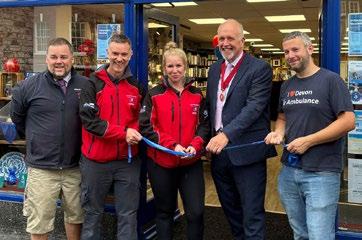

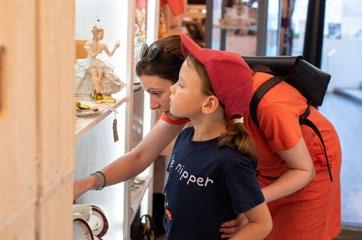
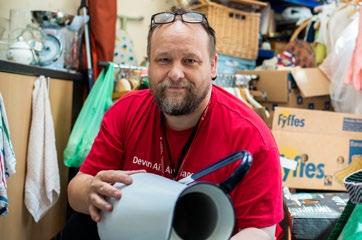
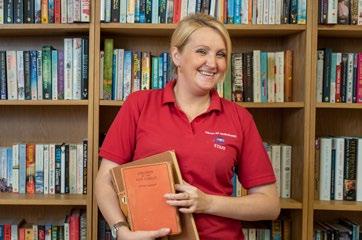
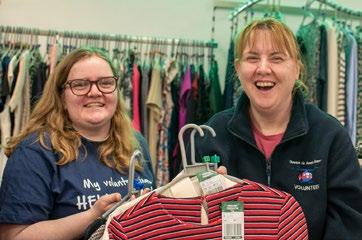
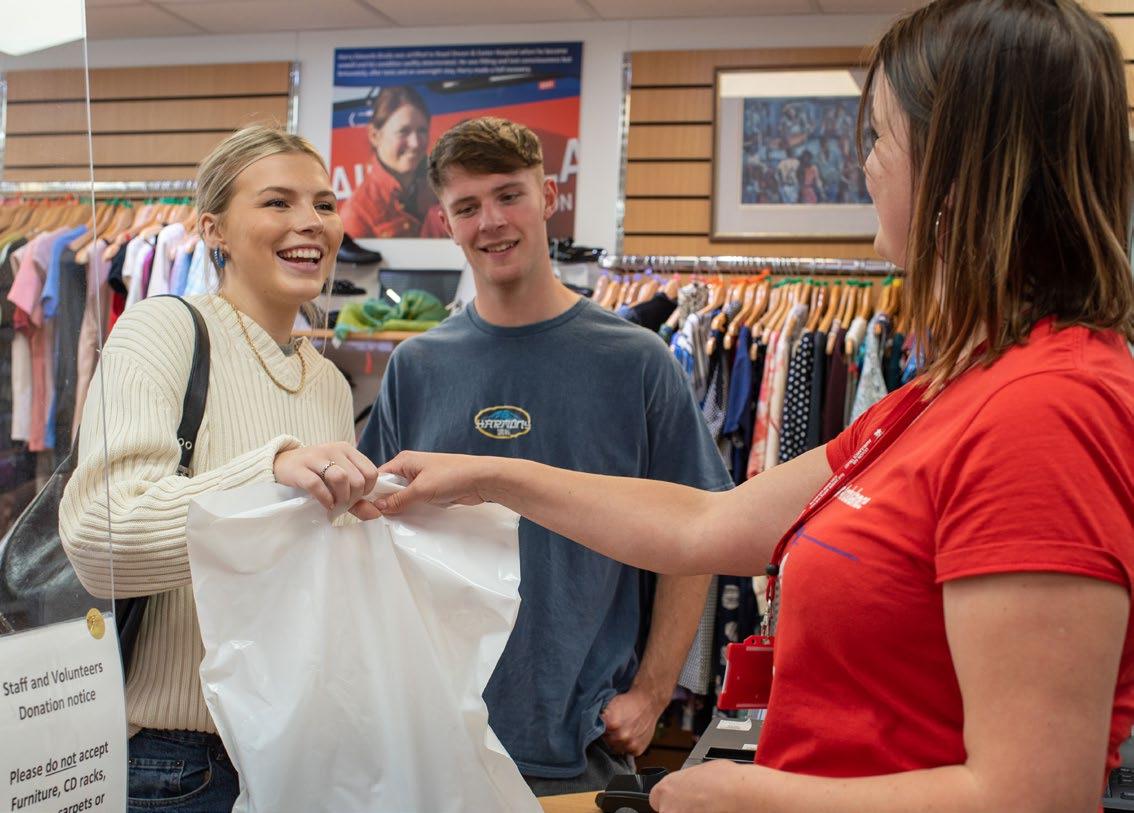
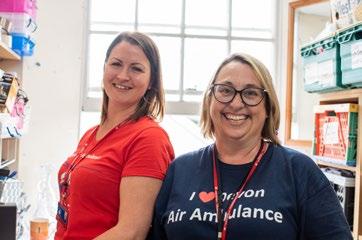
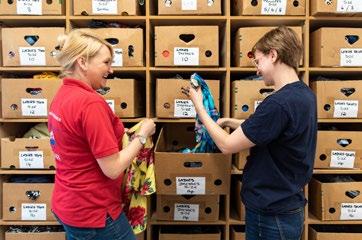

The generous support of the people of Devon is vital to allow us to continue in providing our service and as a Charity we are committed to fundraising in a responsible way.



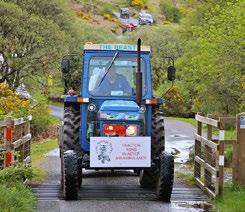
We are registered with the Fundraising Regulator and follow the Code of Fundraising Practice. We are also registered with the Fundraising Preference Service, which allows supporters to ‘opt out’ of receiving communications from us. We received two requests in the year (2023: nil).
In the year we received four complaints directly about our fundraising activities (2023: three). Three of these complaints were in relation to promotion of our lottery by an external agent. Feedback and, where necessary, additional training is always provided to lottery canvassers following any complaint, all of which we take very seriously. One complaint related to delayed response to a donor calling to donate. This incident was carefully investigated and processes adapted as a result. We received nine complaints about our retail operations (2023: three). These related to customer service and donations of goods where shops can no longer accept donations due to health and safety considerations.
Ongoing training and support to improve customer service is always provided, and steps have been taken in the year to improve communication in shop windows regarding an individual shop’s capacity to accept further donations of goods.
Communications remains as important as ever and the ongoing implementation of the Digital Strategy is helping to build the tools and capabilities to do so both internally and externally.
Our new Head of Communications joined us in September and will ensure a cohesive approach to communications and marketing that supports our strategic vision and corporate objectives, as well as maximise fundraising and other income generation activities.

Most of our fundraising activity is carried out by staff directly employed by Devon Air Ambulance, while we also work with a few carefully selected professional partnerships to support our work, such as promotion of the lottery.
Where others are involved in fundraising on our behalf, we work extremely closely with them to ensure the highest possible standards are always maintained, including adherence to our Supporter Promise, the regulator’s code of practice, Gambling Commission licensing conditions and codes of practice, as well as data protection legislation. We pay a fee to support the Fundraising Regulator and their Fundraising Promise with its four underlying values to support implementation of the fundraising code, which are meeting the legal requirements, being open with the public, being honest and being respectful.
Supporters can contact us directly at any time with any questions, comments or concerns via several different methods listed on our website: www.daat.org/complaints-procedure.
While cash management is important in the short term, a realisation of the £8.3 million legacy debtor is expected to ease this at some point in 2025 and the longer-term focus will be continuing to implement the fundraising strategy and move away from the underlying deficit position. After a strong 2023, growth in income did not match expectations in 2024 due to a very challenging external environment. Despite this the direction set by the Income Generation Strategy remains valid and key to maintaining the Charity’s operations, but the expected income growth will take longer than originally envisaged. This will be underpinned by the Digital Strategy and establishment of the Operations Centre and Head office which will drive the one Devon Air Ambulance culture and way of working to deliver the best possible service for the people of Devon.
To attract, train and retain our exceptional people by being a world-class organisation people want to work for.
The People Team has been instrumental in driving several key initiatives and projects throughout 2024, focusing on enhancing the overall employee experience, talent management, and organisational development.
We have invested in our Learning and Development function with the addition of a Learning and Development Co-ordinator. Working closely with our Learning and Organisational Development Manager, the team have focused on several key projects which includes the expansion of our Management Development Programme to include training in subject areas such as coaching and mentoring, digitalising learning content and ease of booking courses via our Sharepoint site, as well as reviewing our frameworks to help embed our new Values and Behaviours launched in 2023.
Towards the end of 2024, the
focus has been on building an Annual Development Review, supported by a behaviour competency framework, supported by 360 degree feedback mechanisms and personal development plans to help ingrain Devon Air Ambulance’s growth mindset.
Recruitment remains relatively busy, especially due to a number of key changes at leadership level in 2024. 39 posts have been out to external advert, with a number of posts also being advertised internally as development opportunities. The
• To reach world class employee engagement
• Nurture the talent pipeline to meet future needs
• Reflect the diversity of our community
• Fully embed our values into our culture
front end of our recruitment process has been digitalised this year, with the introduction of an applicant tracking system. This has been embedded seamlessly into our website and automates much of the process, including transferring data across to the application form from the candidates CV and auto redacting personal information to ensure we operate blind recruitment processes to assist fairness from an equality, diversity and inclusion perspective.
The People Team led on the recruitment process for our new Chief Executive Officer, who will be stepping into outgoing post holder - Heléna Holt’s shoes. This was a key appointment, and involved a robust selection process where Board members, staff and volunteers were able to participate and feedback on the candidates.
The wellbeing of our staff continues to be a priority, particularly against the backdrop of stretched NHS resources. We established a Wellbeing Ambassador role in summer 2023, which is a voluntary role
filled by a small number of staff representatives from across the organisation. They have been provided training such as Mental Health First Aid Training, menopause training and other ad hoc training, in order to help identify any issues arising for colleagues and help ensure that Devon Air Ambulance as an employer has robust support mechanisms to assist staff wellbeing. We have had external trainers deliver wellbeing sessions which bolsters our usual support for staff including access to Employee Assistance Programmes and counselling services.
“Devon Air Ambulance managers are ranked as 2 star by staff, meaning that managers have outstanding levels of engagement with their teams”
2024 has been a more turbulent year for Devon Air Ambulance due to a number of changes within the leadership. This has naturally been reflected within our staff engagement survey, undertaken through Best Companies, where our overall engagement score has decreased from a 2 star ranked employer to a 1 star ranked employer rated as ‘Very Good’ levels of employee engagement. Although the engagement score decreased slightly, it was clear that staff feel very engaged with their line managers who received an overall ranking as a 2 star ‘Outstanding’. Heads of Departments are reviewing the survey feedback with their teams to collate where we can make changes and positive impact for staff.
As the organisation continues to grow in size, the capacity of the team has become under strain over the last 18 months. Due to the People, Talent and Culture Director role changing to Transformation Director and also overseeing our Digital and IT initiatives, and expanding HR case work and projects, a part time People Consultant role was recruited to the team in late 2024 to help ensure the team meets its strategic objectives.
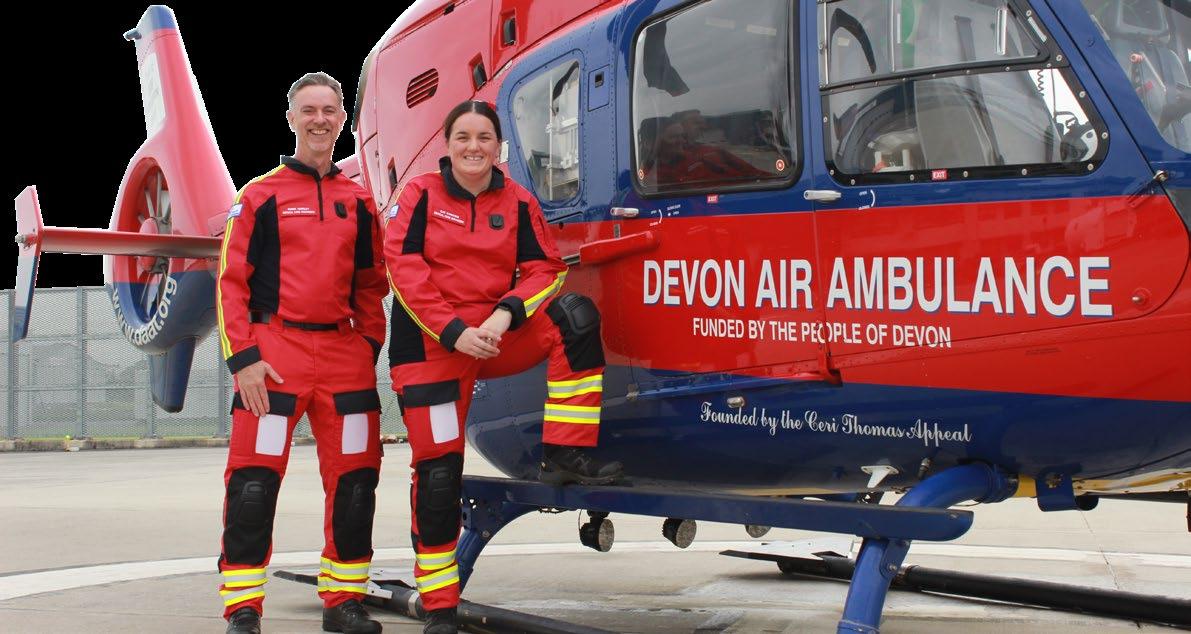
Volunteers are a vital part of the Charity’s operations. We were proud to have 608 registered volunteers at the end of 2024, a remarkable number for a charity of this size.
We are immensely grateful for their selfless contributions, countless hours of dedicated service and unwavering support which has enabled us to thrive and continue our life-saving mission.
As an integral part of the Devon community, we recognise the importance of supporting and engaging with our local community. Our volunteers make a profound impact on the Charity while also gaining significant personal and societal rewards through their involvement. We take great pride in our volunteer community.
It has been a busy year for the Volunteer team and much of the focus has been engagement and touchpoints with our volunteers face to face in the communities of Devon as well as online. The team have continued to work with retail and fundraising teams to recruit volunteers into roles where they are needed as well as identify opportunities for new role development. A lot of work has been going on in the background to review and update various documents to better support volunteers in their roles.
This year our volunteers have collectively donated thousands of hours across various roles. From assisting in our charity shops (64% of the hours contributed) to supporting fundraising events (27%) and providing administrative help (9%), they have ensured the smooth operation of services and helped to raise essential funds. Volunteers engaged with local communities, spreading awareness about our services and the importance of our work. Their efforts have strengthened our ties with the community and garnered additional support. Volunteers provided invaluable support in a wide range of tasks, reducing the demand on our staff enabling them to focus on delivering our mission.
As we move into 2025, we aim to expand our volunteer programme, offering more opportunities for individuals to get involved. We are committed to providing our volunteers with the training and support they need to thrive and make a positive impact on our community. Our volunteers build capacity and resilience, enhancing our service. We pledge to recognise and celebrate their support, ensuring they see the impact of their contributions and feel appreciated for their efforts with Devon Air Ambulance.
The dedication and hard work of our volunteers have been pivotal to our success in 2024. We extend our heartfelt gratitude to each and every one for their contributions. Together, we will continue to save lives and provide critical care to those in need.
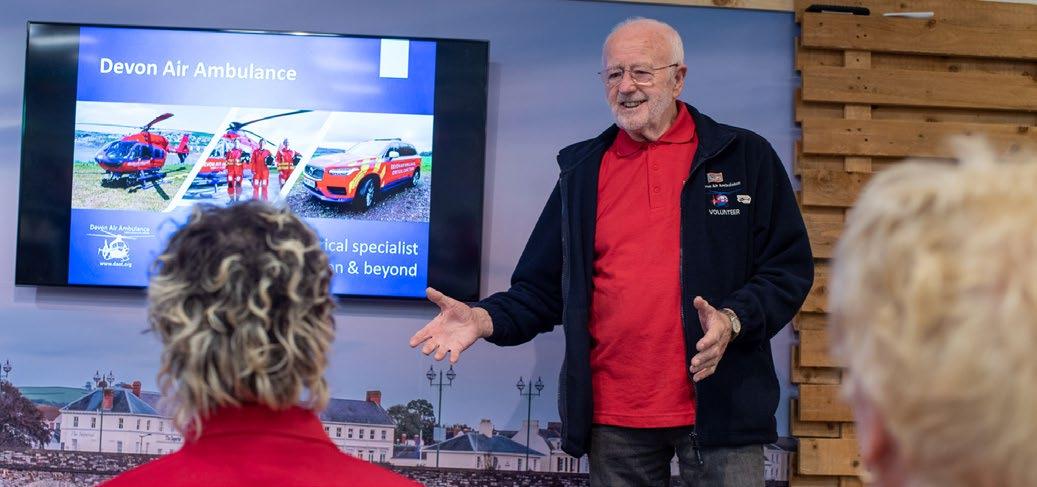
Our volunteers’ commitment and passion have been the backbone of our operations, allowing us to provide critical emergency medical services to the people of Devon and beyond.
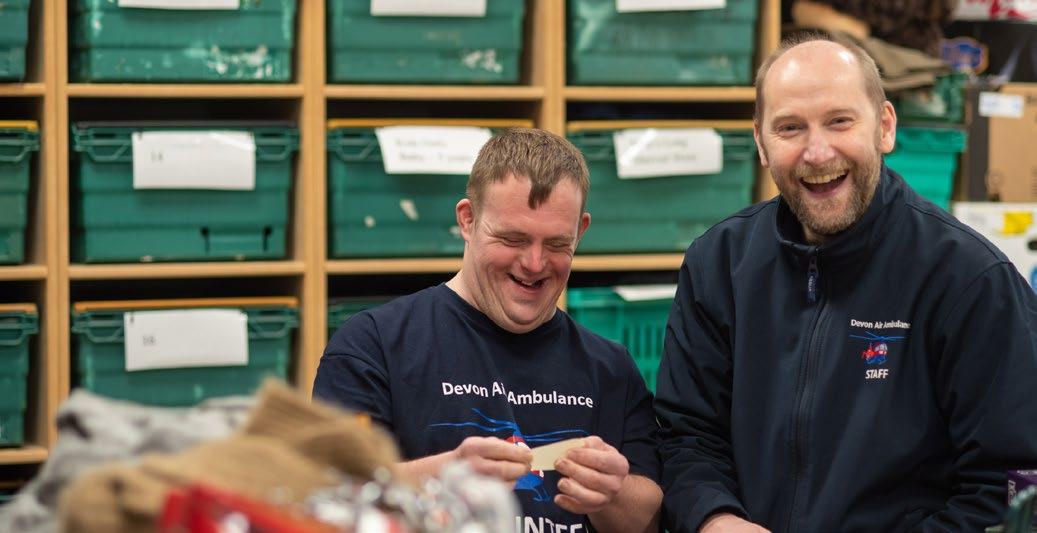
Our Policy continues to be to set salaries using an accountable and transparent process for all staff which includes an internal job evaluation process and benchmarking salaries in line with average market rates for similar roles requiring similar levels of knowledge, skill, experience and responsibility.
There is due regard given to balance and fairness, and the need to ensure value for money. This approach has enabled the Charity to recruit and retain high quality staff in the context of national, regional and local labour markets. The broad range of industries from which we recruit from does present some challenges and we are due to review our approach to pay and aim to review and develop a new policy throughout. This will require significant research to develop a clear evidential basis to our approach and will also require input from the Staff Forum which is due to be formed in 2025.
A general pay uplift of 6% was granted at the start of 2024 while

an increase of 2% followed in 2025. These increases looked to balance offsetting the significant impact of inflation in recent years, retain the competitive nature of the salaries and be affordable for the Charity.
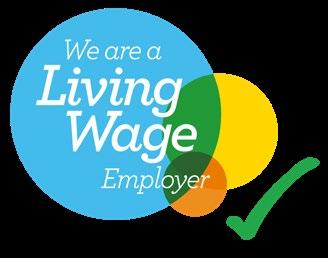
DAA remains committed to the Real Living Wage set by the Living Wage Foundation which
increased to £12.60 at the end of 2024. For those impacted it has meant that their increase at the start of 2025 was higher than the general 2% awarded.
The Board of Trustees and Directors of the wholly owned subsidiary Trading Company are responsible for determining the remuneration of the Senior Leadership Team (SLT), including the Chief Executive. To achieve our strategic goals, DAA requires excellent leadership coupled with effective and professional management. We set salaries in line with our general pay policy principles to be competitive with similar roles and commensurate

with the scope of their responsibilities and demands of the job. Benchmarking data will be sector specific to each role wherever possible. The Trustees and Directors are very aware of their responsibility to donors, patients and the local community and their overriding concern is delivering the best possible service both safely and as cost effectively as possible. To do this, both companies must be run in a business-like way and the SLT is responsible and held accountable for achieving demanding targets for outstanding patient services and helicopter operations, key relationship management, income generation, probity, cost effectiveness and efficiency across the group. In line with sector best practice guidelines, the Trustees and Directors consider a pay ratio of 5:1 x the
median full-time equivalent salary provides a reasonable cap on executive pay. Through this policy the pay multiple of the most highly paid member of staff will be monitored annually by the Remuneration committee.
The creation of a People Forum which had been planned for 2024 is now due to happen in 2025. It is expected to actively engage staff from across the business on key people issues, such as the pay policy review.
We continue to provide training to our people managers through our Management Development Programme, with sessions planned for our senior managers on strategic leadership. We also will be embedding our Values and Behaviours through the
introduction of a competency framework, which includes an Annual Development Review, utilising 360 feedback processes. This will culminate in Personal Development Plans for most roles, with the intention to ensure we are focused on developing our people to have the right skills to ensure Devon Air Ambulance is fit for the future. We continue to review our staff benefits offering with a wider review planned for 2025, as well as keeping our wellbeing and support offer under regular review through our Wellbeing Ambassador group. As part of this we will be engaging a new occupational health provider to enable us to access relevant support more quickly and to digitalise the process for accessing these services and record keeping.
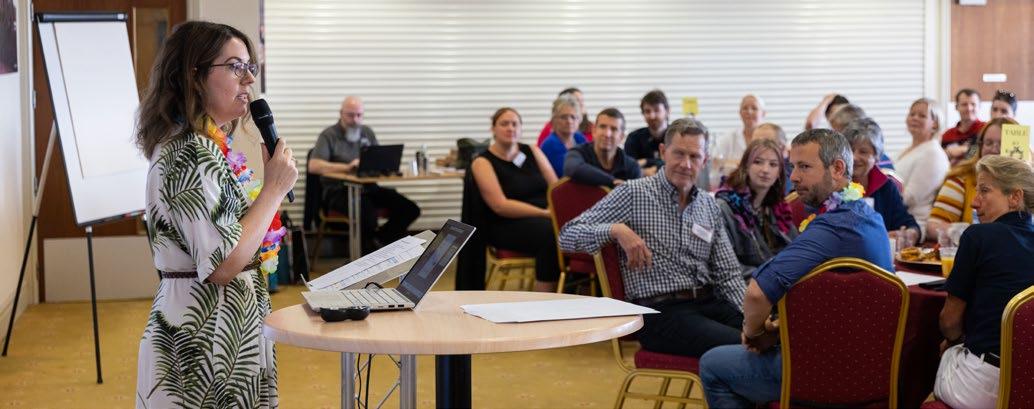

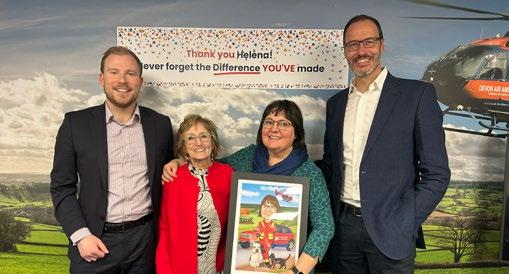
When I first joined Devon Air Ambulance, I was inspired by the dedication and passion of our team. Over the years, we have faced numerous challenges as we’ve striven to continually expand and improve the services we provide for patients, but we have always risen to the occasion, driven by our commitment to saving lives and serving the people of Devon. Our success and the high esteem that the service is held in by our peers across the UK is a testament to the hard work and resilience of our staff, volunteers, and supporters.
One of the highlights of my tenure has been witnessing the growth and evolution of our services. Our innovative approach, commitment to reducing our environmental impact and willingness to embrace new technologies have set us apart and ensured that we remain at the forefront of emergency medical care.
What I will look back on most fondly though will be all the people who have made and continue to make it possible and those we’ve helped. First and foremost, I am immensely grateful to Ann Ralli without whom we would not be where we are today. She’s a true inspiration. Volunteers and staff old and new have helped make this the best job in Devon.
There are so many patients and families I’ve had the joy of meeting over the years, hearing their
stories of recovery, celebrations they might have missed and of loss that might have been even worse without the care of our team.
Despite the challenges of income generation and the unpredictability of legacies in particular, Devon Air Ambulance is in a very strong position to continue to do great things and embrace all the opportunities ahead.
As I step down, I am confident that Devon Air Ambulance is in excellent hands. Greg brings a wealth of experience and skills plus a fresh perspective to the role. I have no doubt that he will build on our successes and lead Devon Air Ambulance to even greater heights.
I want to express my heartfelt thanks to each and every one of you. Your unwavering support and dedication have been the driving force behind our achievements. It has been a privilege to work alongside such a talented and passionate team and I will always cherish the memories we have created together.
Thank you for making my time as CEO so rewarding and fulfilling. It has been an honour and a privilege to lead this remarkable organisation, and I am immensely proud of what we have achieved together.
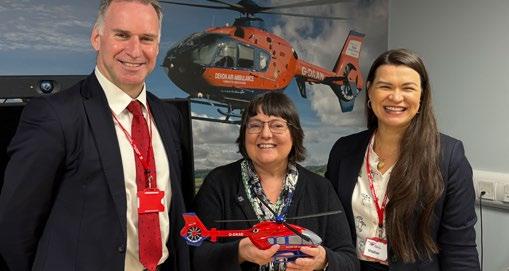

Before joining the ambulance service, Adrian spent five years in the fire service. He began his career with Devon Ambulance Service in 1998 and spent the majority of his time based at Newton Abbot.
In 2009, Adrian joined Devon Air Ambulance, where he advanced to the role of Specialist Paramedic in Critical Care. During his time with us, he has responded to countless missions to help those in need across the county.
In 2024, along with his colleague Paul, Adrian also played a key part in training over 1,500 people in Devon in giving CPR and using a defibrillator as part of our Help With All Your Heart Campaign.
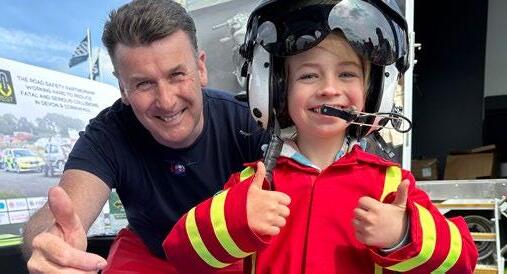
Paul began his ambulance career in 1991 in Oxfordshire, later transferring to Bodmin Ambulance
Station and then to Exeter. He joined Devon Air Ambulance in 2004, where he too progressed to become a Specialist Paramedic in Critical Care.
Together with Kate Adlam, both Paul and Adrian played a key role in establishing the Patient and Family Support Team. Their compassionate work supporting patients and families after serious incidents has been invaluable and has made a lasting difference to countless lives.
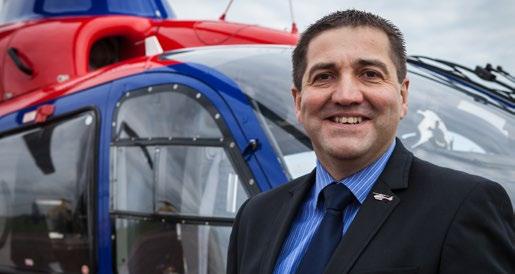
In June 2024, Nigel Hare stepped down from his role as Director of Patient Services, after a very long career in the ambulance service and almost 28 years with Devon Air Ambulance.
We have greatly appreciated Nigel’s support, drive and energy both in shaping and in delivering some progressive step changes in our organisation and service. He made an invaluable contribution to our strategic vision, always with the patient at the heart of his thinking.
Nigel’s impact in the field of patient care has been felt far beyond Devon, as recognised by his peers in 2022 when he received the lifetime achievement award for his contribution to the air ambulance sector nationwide at the Air Ambulance UK Awards of Excellence.
We would like to pass on our thanks to Nigel for his outstanding contribution to Devon Air Ambulance and helping to shape the organisation that we are today.
During the year the dedicated Board Committee was merged with the Digital & Technology Committee into a single group to ensure the knowledge and skills of the Trustee group is used most efficiently .
Having a Board Committee and a committed staff work group called the Green Team
has ensured that focus is maintained in this area despite the challenges provided by the volatile events of recent years, resulting in a long-term benefit to the Charity as well as the wider society it is part of. Supported by policies and processes, this encourages environmental factors to be considered when making decisions with an
impact assessment tool being developed to ensure consistency in this approach.
The Green Team was formed in 2020 to share and discuss a wide range of environmental issues such as climate change and sustainability
• Develop and implement a climate change emergency commitment
• Sustainable management of resources including fuel, buildings and transport
• Scrutiny of investment policy and impact on the environment
• Support an organisational ‘green’ ethos and philosophy
• Promote greater environmental awareness
• Regularly review the risk register for Environmental Sustainability

cross departmentally. The initial focus of the committee delivered on many of the more straightforward successes and the activity of the Green Team did slow in the first half of the year. However, speaking to other organisation’s helped to identify new areas to focus on and activity increased in the second half of the year. Two of the committee’s ongoing focus areas remain ensuring our commitment to Devon’s Climate Emergency declaration and the monitoring of our carbon emissions.
The Head of Facilities has previous experience in the environmental and sustainability area and plays a key role within the Green Team. This helps
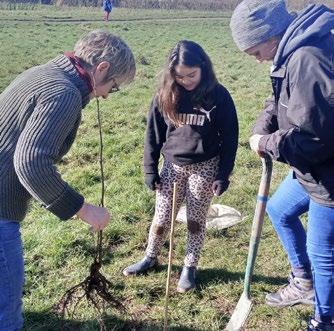
ensure that an environmental and sustainability focus is used when considering premises, airbases, service contracts, waste and vehicle usage as well as planning for new combined
airbase and head office facility in which he is also involved.
The Investments Policy is constantly reviewed in the context of Environmental, Social and Governance (‘ESG’) which was carried out in detail during the prior year with an increase in regular reporting now being received which captures carbon emissions, ESG risk ratings and Sustainable Development Goals. Our portfolio continues to track comfortably above benchmark measures in all areas.
An emissions report was commissioned and completed by Eunomia with the results circulated internally in 2021. We are in the process of developing an app to measure our carbon emissions, initially focusing on scopes 1 and 2, to build on our knowledge generated from the 2021 report.
In 2021 the Charity endorsed the Devon Climate Declaration which has been prepared by a consortium of public, private and voluntary organisations collaborating through a Devon
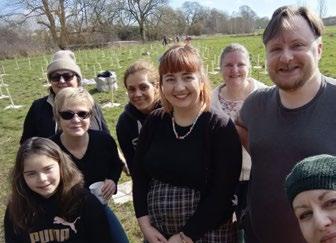
Climate Emergency Response Group, meetings of which have been attended during the year. It sets out ambitions to tackle climate change that covers all of Devon, including those who live, work in and visit our county, and those businesses which are based or operate here.
It’s important that as well as ongoing work through the Green Team, reviewing the investment’s ESG performance and reviewing carbon emissons, ESG is factored into decision making throughout the Charity. It has therefore been embedded into templates and decision-making processes to ensure it influences our approach in all elements going forward. This will be particularly important for significant long-term projects and is therefore being factored into the plans for the new combined airbase and head office facility.
our data and technology to support innovation, operations and collaboration. Our digital vision is One Team, working smarter, leading the way.
Following the Digital Review carried out in 2023 an additional Digital & Technology Committee meeting was held in January 2024 which gave approval to enact the recommendations. The first step of this was a restructure of the current IT team into a broader digital team, increasing the size of the team from five to eight. Lee Angell was recruited as Digital Data & Technology Lead in the second half of the year and began to fill the remaining vacancies in the new look Team which is now split into three streams:
• Technology Service: focus on the core IT delivery, including operating the helpdesk, maintaining cyber security incorporating cyber security training and administration of the infrastructure;
• Software & Business Services: incorporates business process improvement, system integration, software and vendor management, power suite development, decarbonisation of the digital estate and change management;
• Data services: data standards and management.
The growth of the team in numbers and expertise will allow the delivery of the data strategy with initial focus areas including an improved intranet to provide clarity and consistency in communication, a review of key internal processes, integration of administrative functions, rationalisation of data storage and a review of compliance and governance.
The protection of the data within the CRM system and more widely across Devon Air Ambulance, remains of paramount importance to the Charity, in order to not only respect GDPR, but to honor its underlying spirit. This was of particular importance in 2024 as we transitioned to a new CRM system. While an external party was used to provide specialist advice and guidance around GDPR and information governance in the first part of the year, this is now largely being managed internally following the creation of the Digital team and the resulting increase in specific internal expertise.
Protecting ourselves against the continuing threat of cyber fraud remains crucial as levels of cyber fraud continue to increase. All staff receive regular online training and updates to keep their knowledge current around the latest risks and frauds being practiced. One of the roles in the Digital team has a specific focus on cyber fraud prevention, under the guidance of the Department Lead.
will allow us to
• Champion a cohesive approach - technology may be specific, but information is shared across the organisation.
• Create an equitable workforce experience.
• Work in a transparent way, creating visibility of activity, data, outcomes and awareness.
• Look for fresh solutions, we will use agile & MVP approaches, we work in different ways and create tools to facilitate innovation at all levels.
• Recognise that digital technology is an investment, and we will seek to maximise the benefit from our digital assets, making the most of the digital systems we invest in.
• Introduce new systems that will support integration, automation and our data standards within our compliance framework
• Improve and simplify the donor journey embedding it within our core systems
• Design a digital estate with net zero goals at the heart of our decision making
Implementation of the digital strategy is expected to improve efficiencies, support the focus on one Devon Air Ambulance and provide the basis from which the income generation plan will deliver.
It therefore remains a key driver of success for the Charity and integral to the key areas which underpin the service. It will also put us in the best position to identify and utilise operational technological developments in relation to both aviation and medical equipment.

The growth of our service over the last ten years, particularly following clinical independence in 2019 and the pandemic of the following year, means that our two operational bases remain strained, particularly in Exeter.
The intention remains to build a new facility which will future proof our current service, allow the service to develop while bringing together the operations and charity elements into one Devon Air Ambulance.
Such a Centre would be fundamental to support all elements of the strategy – providing a home for supporters to visit and understand our operations will help underpin delivery of the income generation strategy, while our culture will be supported by a single location for most of our staff, excluding retail. The continuing local presence of our retail shops and community fundraising presence will remain crucial in maintaining the strong relationships with our supports across the whole of Devon who we are here to provide our service to.
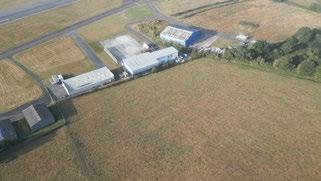
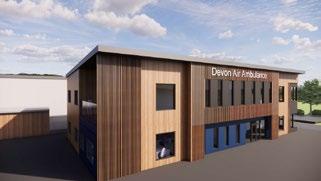
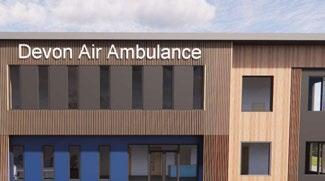
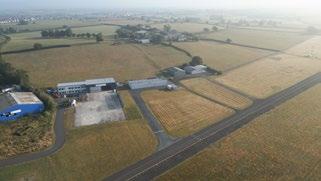
*artists impressions only, not illustrative of actual facilities
Expand our service provision Engage with local communities and businesses Develop outreach and training capabilities
An innovative multi-purpose resource empowering us to deliver the highest quality service across the south-west.
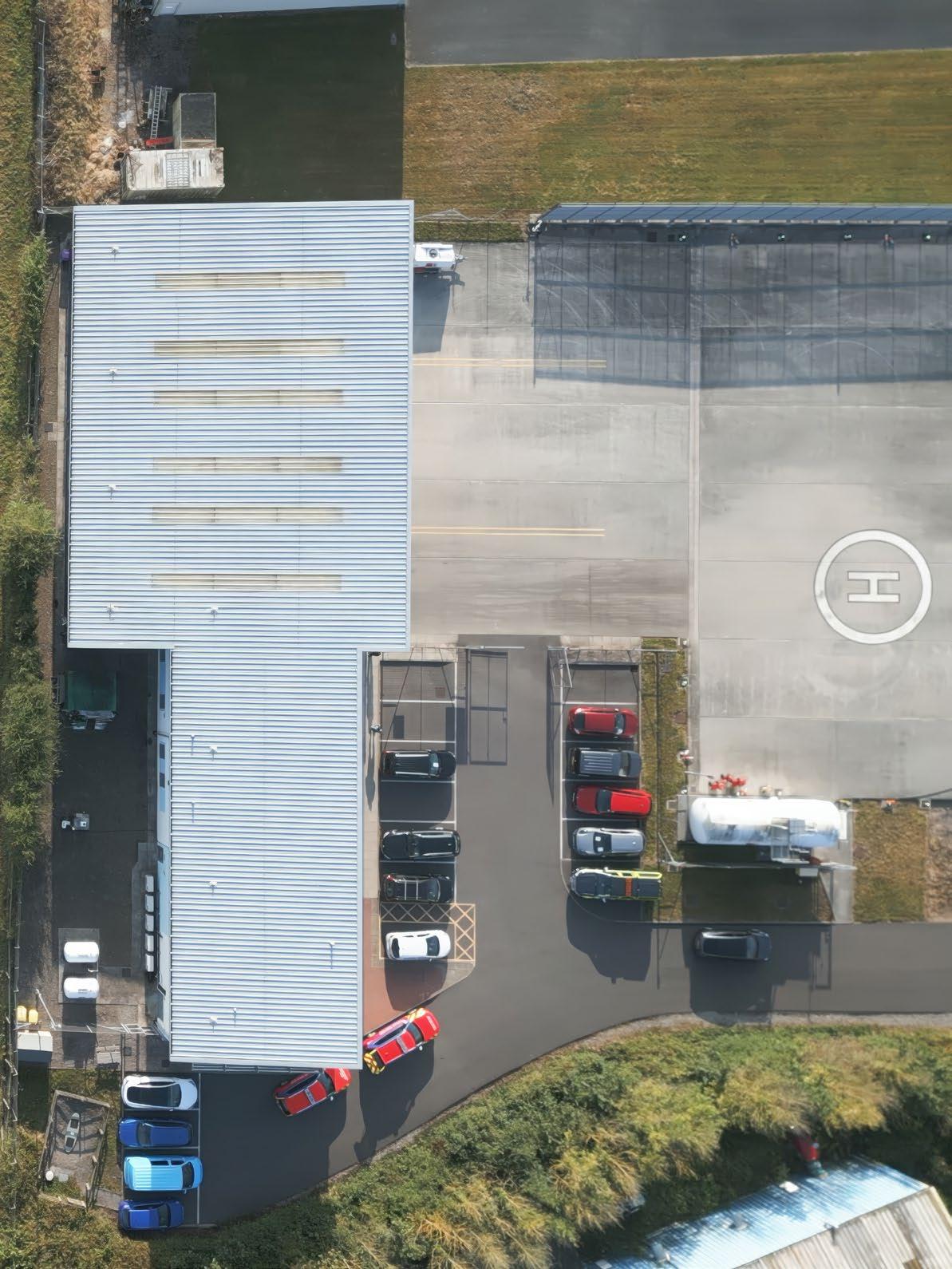
For each £1 we spend on fundraising and income generation (including support costs) in 2024 we raised £2.87. While significantly above the prior year figure of £2.33, this is impacted by legacy income which was lower in 2023 and will fluctuate. The expenditure committed to the income generation strategy is expected to have a positive impact over time so the general trend is expected to be upwards, but on an annual basis it will continue to fluctuate.
Good administration is key to efficiency with a direct impact on the Charity’s effectiveness and so remains a key area under constant review, and one which we expect the Digital Strategy to underpin. Efficient administration drives informed decision making and continual improvements while mitigating risks, potentially saving further costs by safeguarding the Charity’s assets for the ultimate beneficiaries.
The legal requirements and responsibilities have never been higher for Devon Air Ambulance following its sustained growth and the wider regulatory responsibilities, for example through data regulations and health and safety. Both our accounting system and CRM system need to capture thousands of transactions with accuracy while the size of DAA measured by income, expenditure or staff numbers continues to grow.
The balance between costs and benefit is kept under constant review by senior management not just immediately but in the context of the potential impact of decisions over the medium and longer term. Increasing uncertainty in the wider world continues to make this challenging, but by using scenario analysis a wider context is provided to Trustees and senior management to aid decision making. This does not guarantee ‘correct’ decisions – a significant fall or increase in legacy income could drastically alter both the shortand longer-term context very quickly. However, it does provide
a broad but understandable range of possibilities based on the most up to date knowledge and evidence to allow sensible decisions to be made with consideration of the known risks.
Support costs as a percentage of income is a key performance indicator and decreased from 10.9% to 9.8% in 2024. The decrease was mainly driven by the exceptionally high legacy income, and an expected return to ‘normal’ levels in 2025 will most likely result in an increase in this percentage.
The financial statements are dominated by the impact of the high level of income from legacies which has significantly pushed income above expectations, taking the Charity into an unexpected surplus position. The delay in this income being realised as cash has generated a £8.4 million debtor resulting in draw downs on cash

and investments to support the daily operations.
Income increased from £10.7 million to £15.84 million with £4.7 million of this increase coming from legacies. The launch of some new events also increased events revenue from £8,000 to £91,000 while retail and lottery income continued to grow.
Expenditure has also increased in the year, reflecting both the increase in revenue generation and cost increases, moving up 13% to £14.8 million. The expenditure on charitable activities makes up just over 40% of this and increased 9% from £8.4 million to £9.2 million. Retail costs increased by 15% to support the growth in shops and income with salaries continuing to meet the commitment to pay the real Living Wage. Growing the number of shops will be important as costs are expected to continue to increase, so more shops will generate revenue not just directly but also through its promotion of the Charity.
Lottery costs increased 7% due to support costs increasing by £56,000 which largely reflected the salary increase in the year. Costs of donations and
legacies also increased by 34% to £1.9 million, as it was the first complete year with the full team in place to deliver the income strategy, which will gain significant medium and longterm benefit. While the speed of income growth has so far been behind expectations, this is consistent with the difficult fundraising environment being seen nationally by charities, and the expectation remains that income will continue to grow.
The investment gain of £352,000 was mainly generated in the first half of the year which saw a £331,000 gain. The third quarter saw a small decrease in value before this was offset by a marginally larger increase in the final quarter. This portfolio is generally being held for the medium to long-term although drawdowns totaling £3.2 million have been made in the year to support the cash position as the legacy debtor has grown.
Net assets have therefore increased by the surplus of £1.4 million to £22.3 million with £7.9 million tied up in fixed assets. While long term investments aren’t generally intended to be drawn into for the short term, it is acknowledged that these investments are largely liquid
as demonstrated by the draw downs in the year and when assessing availability of short term funding these investments and their degree of liquidity is considered.
Excluding these investments there remains £9,455,000 of net assets to fund ongoing operations, short-term maintenance and repair costs, maintaining and improving the infrastructure and the continuing enhancement of the service.
The Trustees remain mindful of the importance of generating and monitoring sufficient financial resources to continue operations, particularly with the uncertainty of and fluctuations inherent within specific income streams such as legacy income and the wider economic and social uncertainty. With the increase in costs in recent years the risk exposure to a fall in legacy income from the exceptionally high levels of recent years is identified as a key risk.

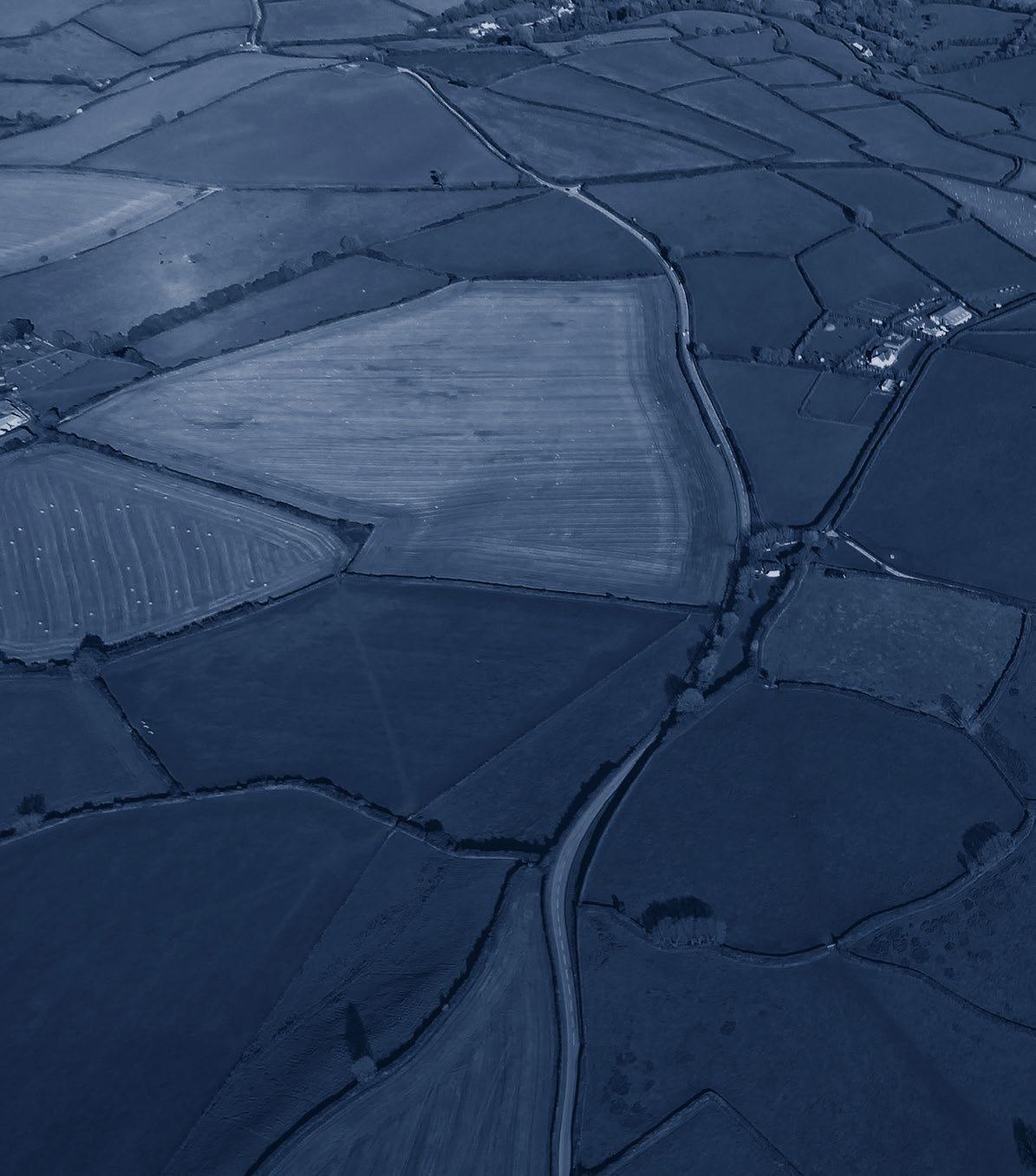
£15,848,000
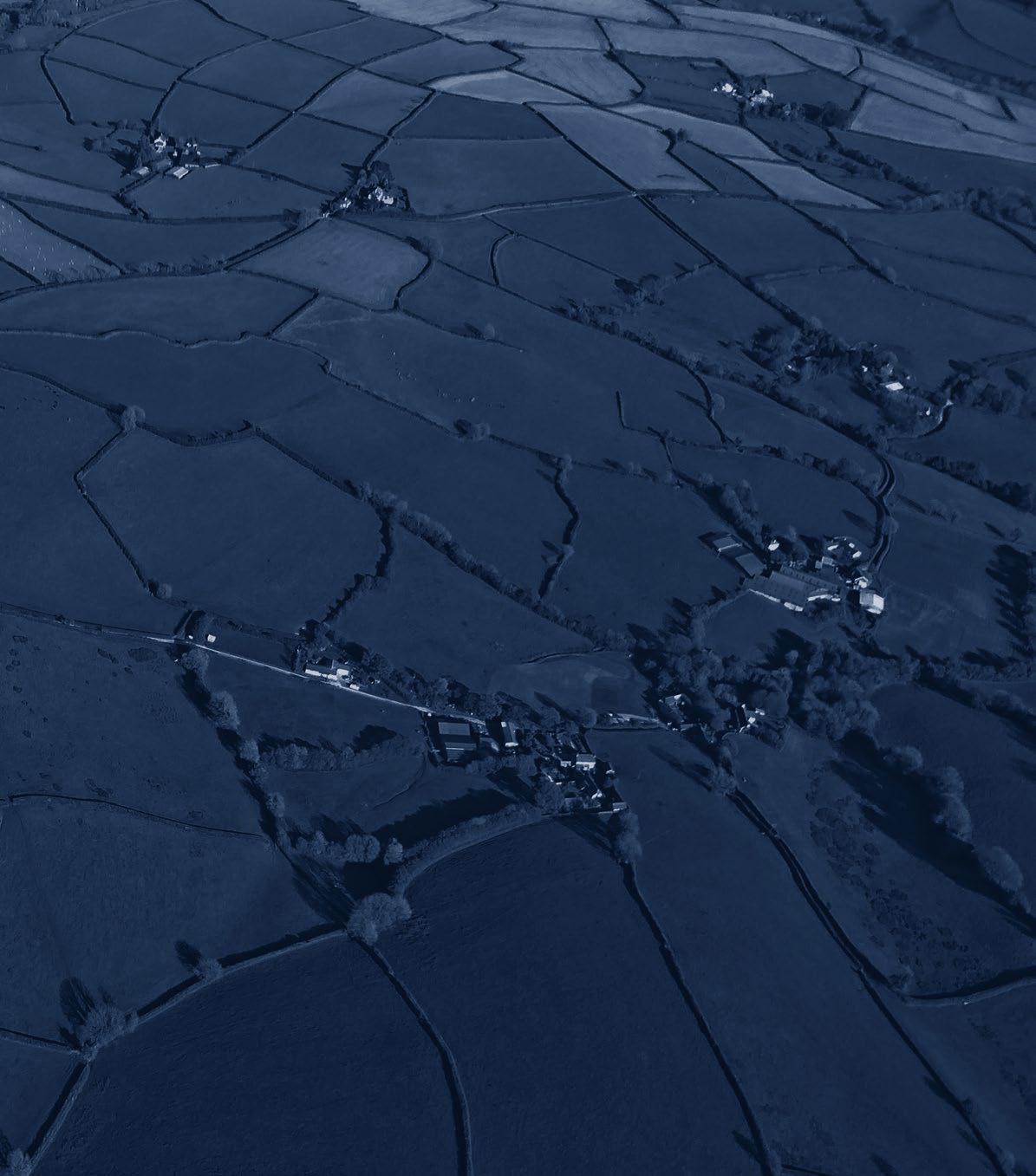
£14,782,000
The Reserves policy and the designations made within the reserves are key tools in monitoring and maintaining cash flows. In line with Charity Commission guidelines, the Trustees monitor the level of reserves to ensure that they are sufficient for the Charity to achieve its objectives. The Trustees deem it necessary to have the security of reserves to enhance and develop the service with confidence, particularly where there may be a timing delay between implementing more costly operational activities and obtaining the necessary funding. This year has demonstrated how irregular timing of legacy income can require the security which reserves provide.
The Trustees review the allocation of the Charity’s reserves and make specific designations where applicable. The Trustees aim for free reserves plus undesignated investments to cover 12 months of expenses following a 33% decrease in revenue. This inclusion of undesignated investments reflects the liquidity of the non-current investments, with this liquidity being regularly monitored. Due to the diverse
income streams in the Charity, it is deemed unlikely that income will drop beyond this level in the short term. While legacy income has been a key component of revenue in recent years and by its nature is expected to fluctuate, it is not an income stream which would entirely disappear and would generate a certain level of income even in a low year. When the Board are making decisions, reserves are considered not just in the present but also looking forward through forecasts to allow for short-term impacts including the fluctuating impact of legacy income. Free reserves are considered to equal
the General Reserve (I.e. total reserves, less restricted and designated funds) less attributed tangible fixed assets.
The Trustees are not looking to set an upper limit on the level of reserves at this stage, as substantial resources will be required to enhance the provision of the service, and the designations which form part of the charity’s total reserves will continue to be regularly reviewed by the Trustees. Forecasts are used to identify and monitor the risk of reserves exceeding the target level for a sustained period.
At the year-end, total reserves were £22.3 million and free reserves, plus undesignated investments, equaled £9.4 million which exceeded the target of £4.2 million representing 12 months net costs following a 33% decrease in revenue. Free reserves excluding undesignated investments also totalled £9.4 million in the year as the investment balance is fully allocated against designated funds. This level of reserves is considered reasonable by the Trustees with costs expected to exceed income for the short and medium term – Trustees are comfortable that this will lead the reserves towards the target level in the longer term although it is likely to fall below the target level in the short-term, with the aim of the income generation strategy then working to maintain reserves at the required level.
The free reserves discussed above are calculated after deduction of restricted and designated funds, which are explained in detail in note 19 of the accounts.
A restricted fund is held relating to the £95,000 provided by
County Air Ambulance to fund two additional critical care cars. These were purchased in the prior year and the restriction has continued to be reduced by depreciation charges, leaving £69,000 at the year-end.
The £226,000 received from the Department of Health & Social Care in 2019 towards the first two critical care cars and defibrillators has been reduced as the assets are depreciated with the balance reducing down to zero in the year.
The £27,000 raised in 2021 from the Christmas Campaign for new ventilators remains unspent while £6,000 of the Health Education England grant provided to establish new processes and participate in simulation training with hospital staff also remains unspent at the year-end. The Norman Trust provided £1,200 to fund the purchase of a syringe driver during 2023 which is not yet purchased.
Four restricted funds have also been set-up in the year for grant funding in relation to the postcollision centre. Two of these related to Vision Zero South West projects, one of which £250,000 was received before being reduced by expenditure in the year to £246,000 and the other where £150,000 was received of which £13,000 was expensed
by the year end. Another grant in relation to the post collision centre generated £21,758 from which £16,686 has been spent in the year to leave a remaining designation of £5,072 while a grant from the Tropical Health Education Trust of £10,000 was also received, with £2,000 of this being spent in the year.
The most significant designation relates to the proposed new combined airbase and head office facility. This was reduced to £4 million in the year as the project continues to progress and generate greater clarity around costs and expected revenue. This designation currently reflects the total expected cost less the expected proceeds from a capital appeal, but both the costs and income may fluctuate as the project progresses further.
The only other designation relates to £507,000 for helicopter maintenance based on the expected cost of an expensive item needing repairing to ensure immediate repair and limited downtime. As the newest aircraft is covered under a Serviced By the Hour (‘SBH’) agreement this is only calculated for G-DAAN and increased in the year due to inflation and exchange fluctuations.
“you don’t really understand the value of a charity like this until you need their help”
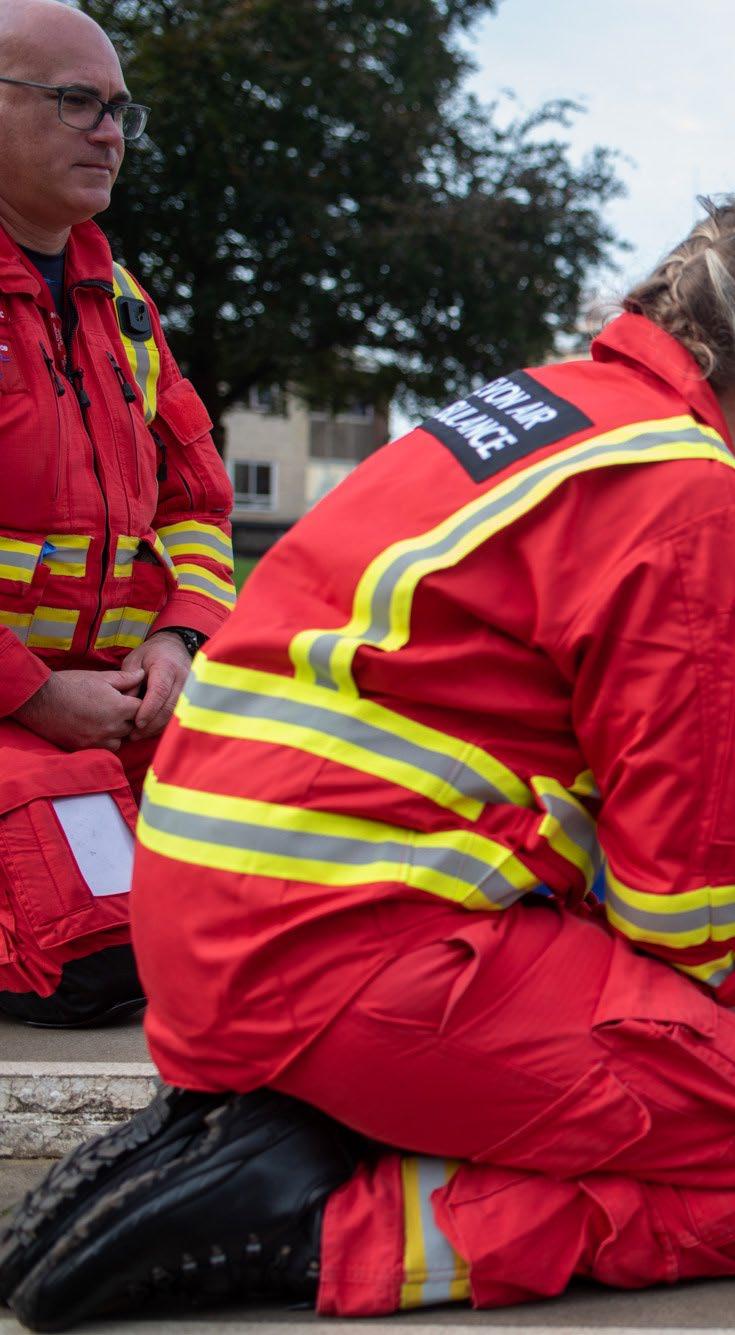
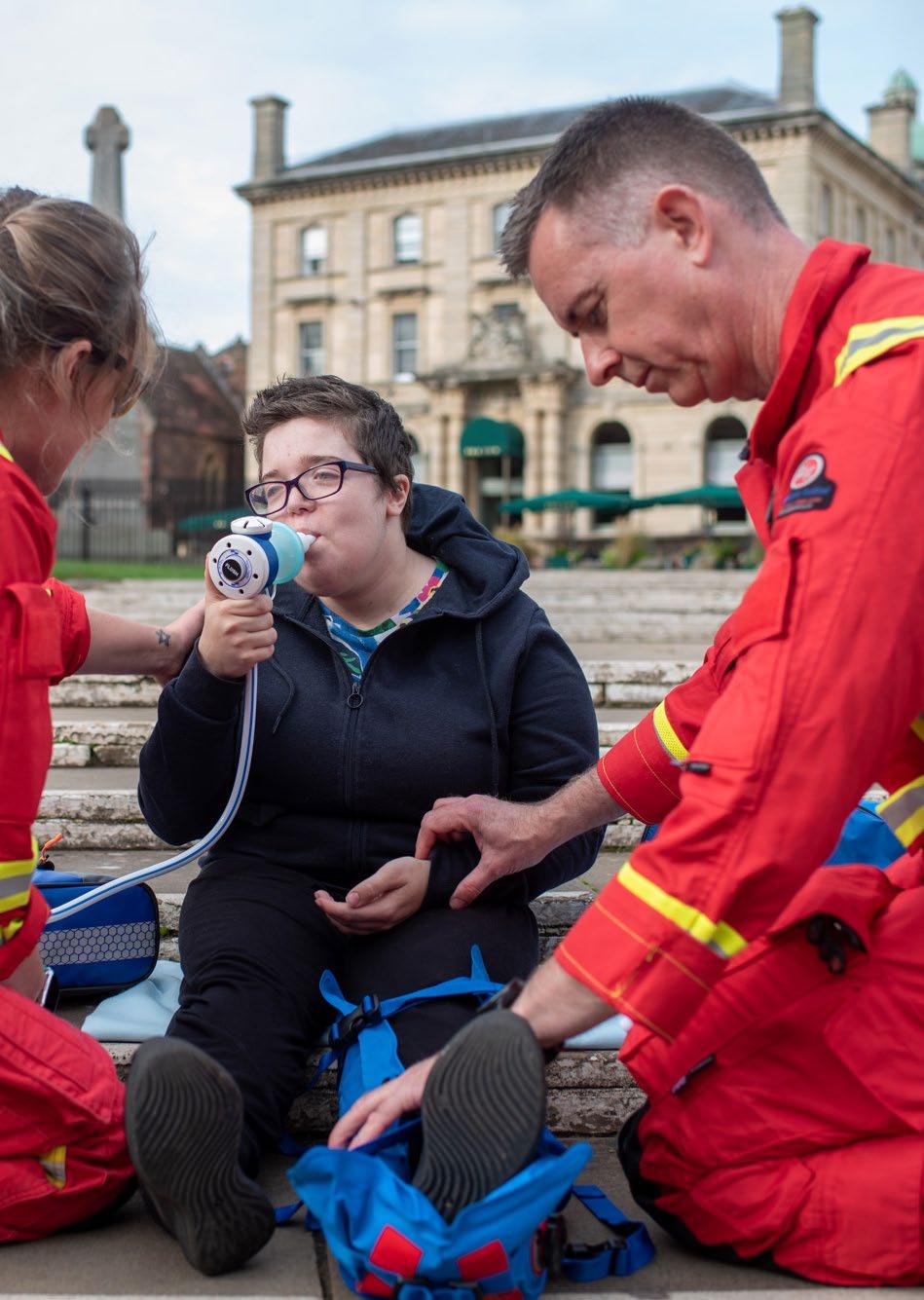
Aligning the cash resources held to the requirements of the reserves policy and future designations and investments is the key objective of managing the financial risk. Cash flow forecasts and their relationship with restricted, designated and free reserves are monitored regularly and reviewed quarterly by the Financial Sustainability and Growth Committee. Additional scenario analysis is also incorporated into this analysis to provide wider context and understanding. There remains a significant exposure to price risk relating to non-current investments and the Trustees have set an investment policy which does not embrace any more risk than a medium risk investor and utilises Francis Clark Financial Planning (‘FCFP’) to oversee the investment manager.
The appointment of the Auditor is reviewed annually with a tender carried out periodically – a tender was carried out in 2022, and this is the second year that Crowe have been appointed as auditors.
Under the Memorandum and Articles of Association, the Charity has the power to invest in any
way the Trustees wish.
A strict investment mandate is in place with Investec and monitored by FCFP and is in line with a detailed Investment Policy. This Policy is under constant review and was updated in 2023 following a review of the revised Charity Commission guidance issued in the year. A detailed discussion and review of the wording around sustainability was completed at the December 2024 meeting with no further amendments being made.
The objective is currently stated as achieving a total return of 3% above inflation (as measured by CPI) on an annualised basis over a rolling 5-year period, to retain the real value of the capital’s purchasing power. While high levels of inflation in the current year have put pressure on this target the Board believes it remains relevant. The Trustees are averse to capital volatility and aim not to embrace any more risk than a medium risk investor. A diversified geographical and asset class mix of assets is permitted, although high risk assets such as derivatives must only make up a small portion
of the portfolio and be used for portfolio management rather than speculation.
These arrangements are under constant review and are believed to remain the best options for Devon Air Ambulance’s current needs despite the shortterm variabilities which have been seem in domestic and international markets in recent years.
“The
Investec were appointed in 2021 following their success in a highly competitive tender process supported by FCFP which was held as the previous manager had been in place for over five years.
Investment gains of £352,000 in the year included £235,000 of unrealised gains and £117,000 of realised gains. Investments are expected to fluctuate in the short term and the Trustees are comfortable with the performance of the investments since the transfer to Investec and through the year.
The Trustees are confident that this investment remains aligned to the Charity’s requirement and that the medium risk investment mandate is being implemented. FCFP monitor Investec and provide independent feedback to the Board who also monitor the performance in line with their expectations and have direct contact and feedback from Investec.
Investment income has fallen in the year to £172,000 from £231,000,
consistent with less funds being held within investments and lower interest rates.
With environmental sustainability and stewardship being one of our four key strands underpinning the strategy, the social investment policy has continued to be a key consideration for Trustees. Environmental, Social and Governance (‘ESG’) factors were part of the criteria used when evaluating the tender in 2021.
The review of the investment mandate and policy in December considered Investec’s approach to ESG and a regular review of key metrics of the investments covering ESG risk ratings, emissions and sustainable development goals and the impact of becoming part of the Rathbones group. These discussions have reassured the Board that they have a suitable approach which is being applied. The policy itself does require Investec to have sufficiently robust assetselection governance in place to ensure that companies/entities which are invested in employ reasonable ethical standards.
The Trustees value the importance of environmental sustainability and stewardship highly and through their Climate Emergency Declaration have committed to ‘investigate and
understand the climate impact of our investment policy.’
Although Devon Air Ambulance has no specific formal investment exclusions, the approach of Investec for their charity clients is to avoid direct investments in companies which derive greater than 10% of their revenue from tobacco, armaments, gambling, higher interest rate lending, adult entertainment, tar sands and thermal coal.
Devon Air Ambulance works closely with the South Western Ambulance Service NHS Foundation Trust (SWASFT) who up until 31st March 2019 employed the paramedics seconded to our service. In partnership with our neighboring air ambulance charities, Cornwall, Dorset & Somerset, Wiltshire and Great Western we commission SWASFT to provide a specialist dispatch team who do a vital job ensuring our services are tasked to the patients who most need the enhanced and critical care we provide.
The support of councils and communities across Devon have been and continue to be significant factors in the achievement of our night operations objective as well as the initial money received through the LIBOR funding
which helped finance much of the night-landing site implementation.
Membership of the Peninsula Trauma Network provides great benefit through peer support, networking and communication across the region.
Through the Air Ambulances UK, we connect with our fellow Air Ambulance Services around the country. This provides opportunities for learning and sharing of best practice across all our activities. This has allowed networks across the Air Ambulance charities to blossom in recent years, with regular meetings taking place between Chairs and CEO’s as well as meetings covering finance, fundraising, people, risk, Information Technology and environmental sustainability amongst numerous others. In addition, staff across DAA subscribe to relevant professional bodies.
Dave Hawes, the Director of Corporate Services & Accountable Manager, represented Devon Air Ambulance and the wider small and medium charity sector to the Justice Select Committee in May, presenting evidence on the financial impact of probate delays.
Working in partnership with other organisations is seen as key opportunity to work towards our charitable objectives. The Post Collision centre and Vision Zero is a great example where working with other organisations gives us more support to make a greater impact on our charitable objectives both in Devon where road accidents impact many of our patients, and more widely across the rest of Britain and the World.
Both helicopters are owned and operated by the Charity’s wholly owned subsidiary, Devon Air Ambulance Trading Company Limited. The 2023 digital review work was carried out by Cosmic and one of the joint CEOs of Cosmic, Julie Hawker, is also a Trustee of DAA. Julie was not involved at all in the tender which was carried out to appoint Cosmic and voluntarily stepped back from the Digital and Technology Committee during this period to ensure clear separation between herself and the review which she was not involved in. She was not involved in Board discussion regarding this review during 2023 and the Board are comfortable that this potential conflict of interest has been managed and any potential risks fully
mitigated. During the year Julie has returned to the Committee as the recommendations have been enacted with limited direct involvement of Cosmic, who did provide some support with forming the new job specifications.
Cosmic have also provided Workplace Digital Skills training for 10 employees which was funded by Devon County Council. Julie was not involved in arranging or providing the training, or any decision making by Devon Air Ambulance in relation to the training.
Devon Air Ambulance Trust was formed in 1991 to raise and receive funds to provide an emergency response ambulance service primarily in the county of Devon. It became an incorporated company, limited by guarantee, on the 30 September 1999 and is governed by its Memorandum and Articles of Association dated 29 September 1999.
Several Special Resolutions were passed in 2009, 2016, 2017, 2019 and 2021 to ensure that the Articles of Association remained up-to-date, relevant and complete. The most recent change in early 2021 was to
ensure that the Articles better reflected the need for remote Board meetings as well as the closed membership; the changes were approved and adopted by the Board on 13 April 2021.
An update of the Articles is currently under review which would allow a maximum Trustee term of 9 years without a 3 year break which is currently required after the first 6 years.
The Board of Trustee is made up of independent members who undertake the role on a voluntary basis and who bring a broad range of professional skills, experience and expertise to the Charity.
A comprehensive Trustee Recruitment Brochure contains detailed information about the role of a trustee, organisational information, recruitment process details and trustee testimonials, can be shared through contacts, social media and via trustee
recruitment platforms and portals. Any expression of interest by an individual who would like to join the Devon Air Ambulance board as a new trustee will be considered on merit, on a caseby-case basis, as and when it is received.
Once an expression of interest is received from a prospective Trustee, it is reviewed and the applicant invited to attend two separate meetings with one panel consisting of the Chair and Trustee representatives, and the other panel made up of the CEO and Senior Leadership Team. A debrief follows between both interviewing panels and, if it was agreed that an applicant was suitable to be appointed to the Board, they are invited to attend the next quarterly board meeting, at which time they would be formally confirmed in post. Following a focus on Trustee recruitment during the middle of the year a number of potential Trustees have followed this process as at the year-end and are expected to be appointed shorly after the signing of these accounts in April 2025.
There were no changes to the Charity Board during the year, although Julie Hawker did come to the end of her second term at the end of March following the year-end. We are thankful for the contribution of Julie as well as all our Trustees who contribute their time and effort to guide the Charity.
There remains a good balance of Trustees who have been in a position for several years and having built up a strong corporate memory combining with newer Trustees who naturally bring a fresh perspective, particularly with further appointments expected in April 2025. The individuals on the Board bring with them an impressive array of experience and expertise across a broad range of fields pertaining to the delivery of Devon Air Ambulances service, and the stability has also created a longer term feeling of certainty and resilience. The upcoming appointments will also ensure that the Board remains resilient ahead of future departures that will occur as terms come to an end.
“Devon Air Ambulance Trust was formed in 1991 to raise and receive funds to provide an emergency response ambulance service”
After being formally appointed, all new Trustees are given access to Centrik, the document management system used by Devon Air Ambulance and access to Microsoft Teams. Trustees and Trading Company Directors also join a Governance ‘team’ which is used for internal messaging, collaboration sharing information relating to all aspects of governance. They are provided with a copy of the Trustees’ Handbook which includes a briefing of their legal obligations under charity and company law, the content of the Memorandum and Articles of Association, and the committee and decision-making processes of the Charity, as well as access to all committee and board meeting minutes, agendas and supporting papers. New
trustees are also sign-posted to the Strategic Plan and the most current financial information contained within the Annual Report and Accounts which can be found on the Charity’s website.
During the year guidance has continued to be refined to improve the simplicity of the guidance which Trustees and Directors receive. Both Trustees and Directors come from a variety of backgrounds which strengthens cognitive diversity but will also have differing experiences and knowledge of approaches to governance. Trustees of the Charity not only have responsibilities as Trustees but also as Directors and members, so the new guidance is expected to give greater clarity in what can become a complex area.
A Scheme of Delegation has
also been drafted in the year and approved at the final Board meeting. This has aimed to ensure that decision making, responsibilities and the governance processes are clear, bringing together guidance which was previously spread over various documents.
New Trustees were also invited to individual briefing meetings with the Senior Leadership Team and other key employees within the Charity to learn more about their roles and responsibilities and individual business areas. New Trustees are invited to visit the airbases to meet with aircrew and paramedics to see the operational delivery of the service at first hand.
The annual Joint Board Away Day did not take place in 2024 but the next one has been arranged for June 2025.
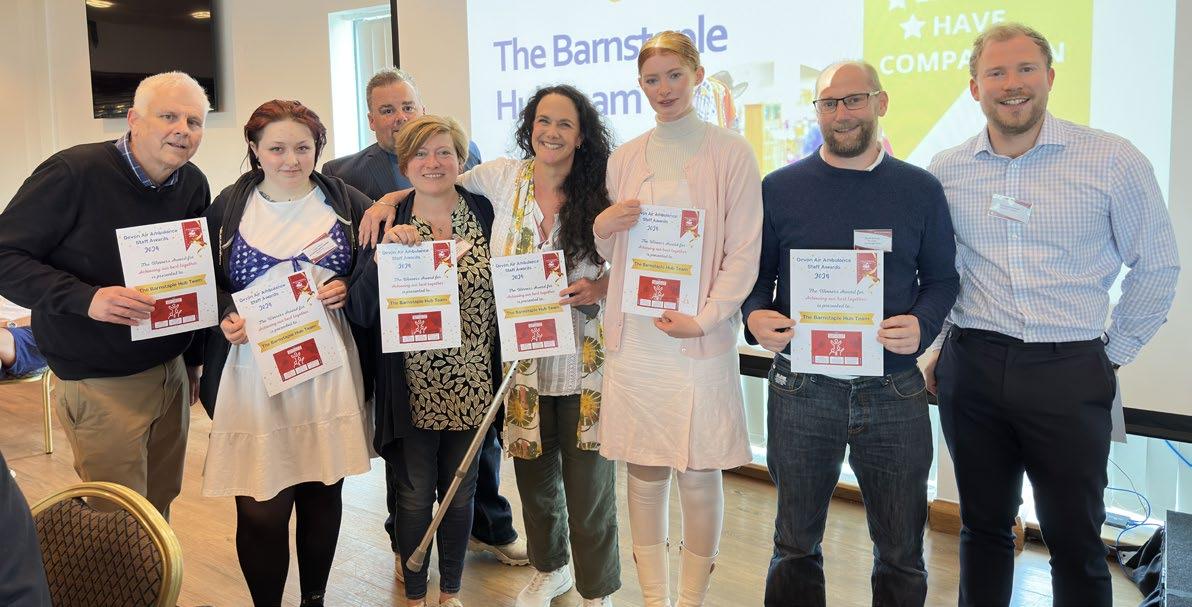
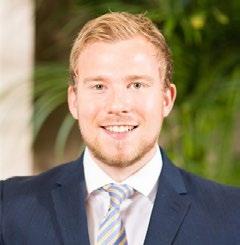










Good governance in any charity is fundamental to its effectiveness and success. Devon Air Ambulance promotes the principles of the Charity Governance Code which represents a standard of good governance practice that all charities should aspire to achieve. The Code is a practical tool which helps charities and their trustees develop high standards, develops an appropriate culture, encourages diversity and ensures Trustees are compliant with relevant legislation and regulations.
The Board of Trustees administers the Charity, and the committee structure mirrors the framework of the strategic plan and its four key areas of focus. This structure is believed to remain relevant and appropriate to ensure high engagement and collaboration between the Board and the Senior Leadership Team. It is designed to enable them to jointly drive forward and deliver on the strategic priorities of the Charity.
Income generation, efficiency and risk, finance including reserves, budgets, investments and internal audit and control.
People, Talent & Culture Talent management, promotion of high-performing culture, encouraging diversity.
A merger in the year of the Environmental, Sustainability & Stewardship Committee with the Digital & Technological Committee.
Commitment to the climate change emergency, sustainable management of resources, scrutiny of investment policy, environmental impact, supporting ‘green’ ethos and philosophy.
Creating a digital culture, promoting innovation in technology, creating efficiency gains, monitoring emerging technologies, ensuring robust cyber-security.
Independent to these committees is an additional committee:
This operates with an independent Chair, reporting back to the Financial Growth & Sustainability Committee on the annual audit process and the internal control environment.
The three key committees and both Boards meet four times a year. Additional meetings can be held as and when required and ad hoc working parties can also be formed to address specific and/or time-critical strategic issues. The Audit Committee met three times in the year, with two meetings focusing on the annual audit and the other having a greater focus on the control’s environment.
For shorter term projects working parties can be put in place including both Trustees and members of the executive team – the new operations centre and head office is an example of where a working party has been put in place.
Trustees are appointed for an initial term of three years with the
option for this to be extended by a further term of three years. The maximum consecutive term a trustee may serve, therefore, is six years. Trustees may then be reappointed for one further term of one year after a three-year break from holding office. An update of the Articles is currently under review which would allow a maximum Trustee term of 9 years without a 3 year break which is currently required after the first 6 years. Trustee roles and responsibilities, and particularly the roles of the honorary officers, are clearly defined within the Scheme of Delegation.
The Chief Executive is appointed by the Trustees to manage the day-to-day operations of the Charity. To facilitate efficient management of the organisation, the Chief Executive has delegated authority, with limits set by the Trustees for matters including finance, fundraising, public relations, marketing and employment. The parameters of the Chief Executive’s authority are clearly defined within the Scheme of Delegation.
Following Heléna Holt announcing her retirement during the year, a new Chief Executive Officer was recruited in the year, with Greg Allen joining early in 2025.





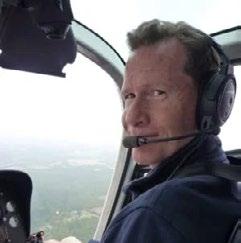




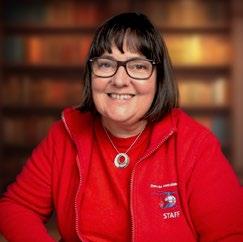

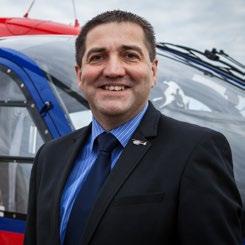


The Trustees have put in place a formal risk management process to assess any risks to the charity and implement risk management strategies. This involves identifying the types of risks the charity faces, prioritising them in terms of potential impact and likelihood of occurrence and identifying means of mitigating risk. This is supplemented by an evaluation of what internal reviews, external reviews and compliance are in place to mitigate these risks, and a gap analysis applied.
The Trustees review the adequacy of the Charity’s current financial controls on a regular basis and each of the identified risks through the committees in place. The Senior Leadership Team also review individual elements of the risk register as part of their internal weekly meetings. The trustees can report that, in their opinion, the Charity’s internal financial controls conform to Charity Commission guidelines.
Recent years have seen an increase in the number of significant risks identified in the more volatile environment and the most significant risks defined by the trustees are listed below
with their respective mitigations following:
a. Lack of leadership and strategy: following the departures of two members of the Senior Leadership Team and ahead of Heléna’s retirement as Chief Executive Officer in early 2025 the likelihood of this risk was increased. Following the appointment of Greg as Chief Executive Officer and a Joint Operations Director in 2025 this risk is expected to reduce.
b. Staff absence: following the senior level departures in the year and the time taken to recruit replacements, prolonged periods without some senior roles being populated increased the risk to operational ability and meeting regulatory requirements.
c. Revenue risk: collapse of a significant revenue stream or combination of revenue streams could impact the ability for DAA to operate. This remains highly relevant as legacy income continues to make-up a significant proportion of income.
d. Inadequate level of reserves: insufficient cash or reserves in place to support the long-term objectives of DAA.
e. Macroeconomic events creating financial instability: while inflation has settled in the year the risk remains of sustained high levels of inflation increasing costs above increases in revenue leading to a shortage in cash and reserves.
f. New combined airbase and head office facility: as a large scale build project this includes risks of cost and timing overruns, as well as the knock-on impact of the building not fulfilling its requirements.
g. Shortage of pilots: aircraft availability could be impacted by a shortage of pilots.
h. Impact on staff of rising cost-of-living: Negative impact on staff and potential costs of retention
i. Communication and strategic development challenges: following the changes in senior leadership within operations an increased risk of communication breakdown and cultural disruption was identified.
j. Insufficient insurance: insurance coverage not sufficient to meet significant insurance claim.
The recruitments of Greg Allen as Chief Executive Officer and of a new Joint Operations Director at the end of March has helped return the Senior Leadership Team to full strength and mitigates the first two risks. A new Head of Communications also joined in the year and will continue to help cascade and communicate the strategic direction, following on from the meetings held in the year between leadership and the operations team to discuss concerns and provide clarity.
Following the pandemic and with a general increase in volatility and uncertainty, Board reporting has been expanded to include scenario planning which incorporates more variables and widens the context for taking decisions. This has helped mitigate the risk of inadequate levels of reserves, while monitoring dependence on different income streams and the impact of the Income Generation Strategy will assist in the management revenue risk. This stronger reporting and review process also aids the ability to monitor and react to macroeconomic events which are difficult to influence externally.
High levels of reserves, investment and cash help mitigate this risk short-term but generating greater income, finding efficiencies or cost
reductions will be required into the longer term. The Income Generation Strategy is focused on the first of these elements, while embedding the recommendations of the digital review will be key in managing the other two factors.
The airbase and head office build process is being overseen by a working party including representatives from the Board, while the Senior Leadership Team has a weekly meeting arranged to monitor and input into the process. This internal oversight has also been supported by specific external sector expertise such as the appointment of Benison Associates to act as an Employer’s Agent.
Salaries, benefits and employment terms for our pilots are constantly being reviewed and information gathered from the market to ensure that pilot salaries remain competitive.
A key supplier relationship which has been maintained over a long period is with the Charity’s insurance broker which has generated a long term, broad and detailed knowledge of Devon Air Ambulance to ensure that the insurance exposure is limited, managed and monitored. This is reviewed in detail each year with subject specialist experts from within the Charity.
“Recent years have seen an increase in the number of significant risks identified in the more volatile environment”
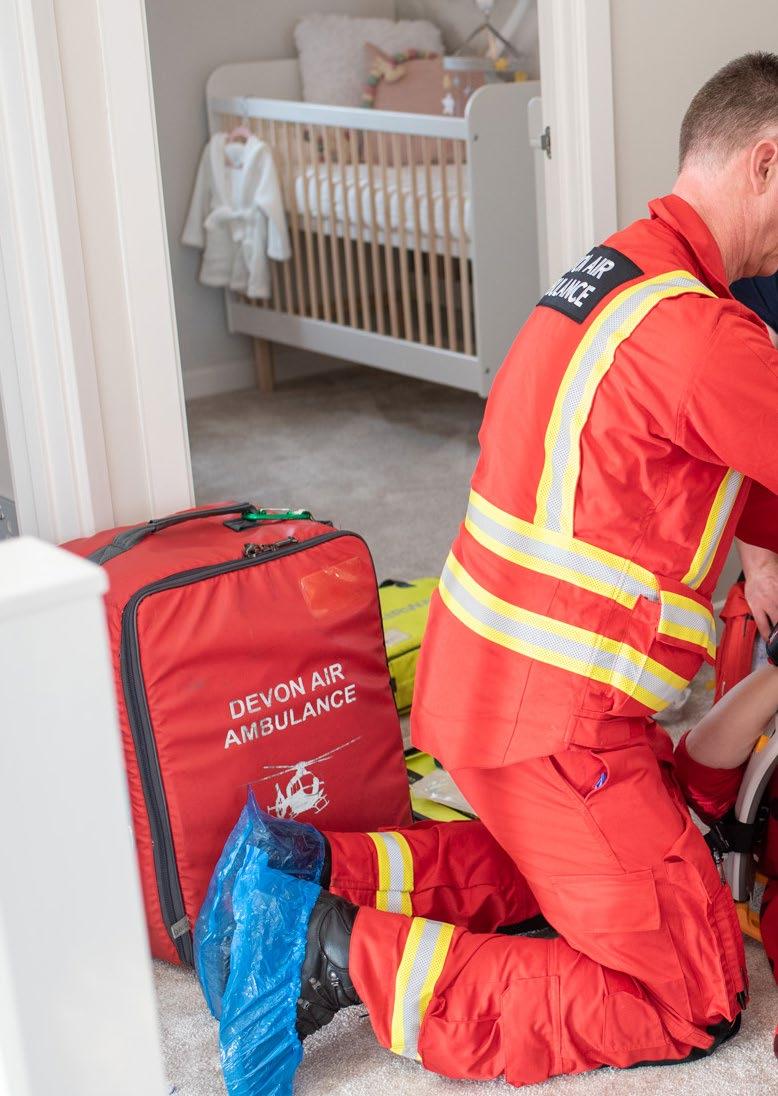
“we’re here to support those in need during their most vulnerable moments”
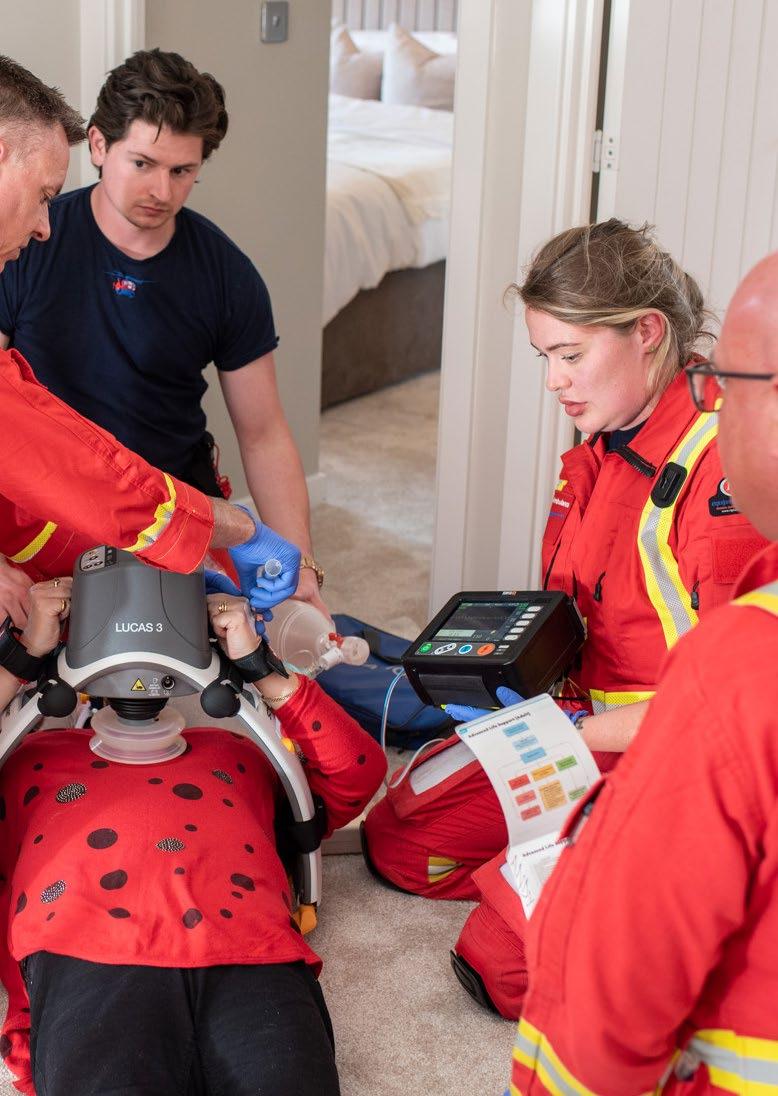
The Trustees (who are also directors of Devon Air Ambulance Trust for the purposes of company law) are responsible for preparing the Trustees’ Report (incorporating the Strategic Report) and the financial statements in accordance with applicable law and United Kingdom Accounting Standards (United Kingdom Generally Accepted Accounting Practice).
Company law requires the Trustees to prepare financial statements for each financial year which give a true and fair view of the state of the affairs of the charitable company and the group and of the incoming resources and application of resources, including the income and expenditure of the charitable group for that period. In preparing these financial statements, the trustees are required to:
• Select suitable accounting policies and then apply them consistently;
• Observe the methods and principles in the Charities SORP;
• Make judgements and accounting estimates that are reasonable and prudent;
• State whether applicable UK Accounting Standards have been followed, subject to any material departures disclosed and explained in the financial statement, and
• Prepare the financial statements on the going concern basis unless it is inappropriate to presume that the charitable company will continue in business.
The Trustees are responsible for keeping adequate accounting records that disclose with reasonable accuracy at any time the financial position of the charitable company and enable them to ensure that the financial statements comply with the Companies Act 2006. The Trustees are also responsible for safeguarding the assets of the charitable company and the group and hence for taking reasonable steps for the prevention and detection of fraud and other irregularities. Insofar as the Trustees are aware:
• There is no relevant audit information of which the charitable company’s auditors are unaware, and
• The Trustees have taken all steps that they ought to have taken to make themselves aware of any relevant audit information and to establish that the auditors are aware of that information.
Auditors
A resolution to appoint Crowe as auditors for the following year was proposed at the December 2022 Board Meeting in accordance with section 485 of the Companies Act 2006.
The Trustees’ Report incorporating the Strategic Report was approved by the Board and signed on its behalf by:

William Matthewman Chair of Trustees
We have audited the financial statements of Devon Air Ambulance Trust (‘the charitable company’) and its subsidiary (‘the group’) for the year ended 31 December 2024 which comprise the Consolidated Statement of Financial Activities, Consolidated Balance Sheet, Charity Balance Sheet, Consolidated Statement of Cash Flows and notes to the financial statements, including significant accounting policies. The financial reporting framework that has been applied in their preparation is applicable law and United Kingdom Accounting Standards, including Financial Reporting Standard 102 ‘The Financial Reporting Standard applicable in the UK and Republic of Ireland’ (United Kingdom Generally Accepted Accounting Practice).
In our opinion the financial statements:
• Give a true and fair view of the state of the group’s and the charitable company’s affairs as at 31 December 2024 and of the group’s income and expenditure, for the year then ended;
• Have been properly prepared in accordance with United Kingdom Generally Accepted Accounting Practice; and
• Have been prepared in accordance with the requirements of the Companies Act 2006.
We conducted our audit in accordance with International Standards on Auditing (UK) (ISAs (UK)) and applicable law. Our responsibilities under those standards are further described in the Auditor’s responsibilities for the audit of the financial statements section of our report. We are independent of the group in accordance with the ethical requirements that are relevant to our audit of the financial statements in the UK, including the FRC’s Ethical Standard, and we have fulfilled our other ethical responsibilities in accordance with these requirements. We believe that the audit evidence we have obtained is sufficient and appropriate to provide a basis for our opinion.
In auditing the financial statements, we have concluded that the trustees’ use of the going concern basis of accounting in the preparation of the financial statements is appropriate. Based on the work we have performed, we have not identified any material uncertainties relating to events or conditions that, individually or collectively, may cast significant doubt on the charitable company’s or the group’s ability to continue as a going concern for a period of at least twelve months from when the financial statements are authorised for issue.
Our responsibilities and the responsibilities of the trustees with respect to going concern are described in the relevant sections of this report.
The trustees are responsible for the other information contained within the annual report. The other information comprises the information included in the annual report, other than the financial statements and our auditor’s report thereon. Our
opinion on the financial statements does not cover the other information and,except to the extent otherwise explicitly stated in our report, we do not express any form of assurance conclusion thereon.
Our responsibility is to read the other information and, in doing so, consider whether the other information is materially inconsistent with the financial statements or our knowledge obtained in the audit or otherwise appears to be materially misstated. If we identify such material inconsistencies or apparent material misstatements, we are required to determine whether this gives rise to a material misstatement in the financial statements themselves. If, based on the work we have performed, we conclude that there is a material misstatement of this other information, we are required to report that fact.
We have nothing to report in this regard.
Opinion on other matter prescribed by the Companies Act 2006
In our opinion based on the work undertaken in the course of our audit:
• The information given in the Trustees’ Report, which includes the Directors’ Report and the Strategic Report prepared for the purposes of company law, for the financial year for which the Financial statements are prepared is consistent with the Financial statements; and
• The Strategic Report and the Directors’ Report included within the Trustees’ Report have been prepared in accordance with applicable legal requirements.
Matters on which we are required to report by exception
In light of the knowledge and understanding of the group and charitable company and their environment obtained in the course of the audit, we have not identified material misstatements in the Strategic Report or the Directors’ Report included within the Trustees’ Report.
We have nothing to report in respect of the following matters in relation to which the Companies Act 2006 requires us to report to you if, in our opinion:
• Adequate and proper accounting records have not been kept; or
• The Financial statements are not in agreement with the accounting records and returns; or
• Certain disclosures of trustees’ remuneration specified by law are not made; or
• We have not received all the information and explanations we require for our audit.
As explained more fully in the trustees’ responsibilities statement set out on page 64, the trustees (who are also the directors of the charitable company for the purposes of company law) are responsible for the preparation of the Financial statements and for being satisfied that they give a true and fair view, and for such internal control as the trustees determine is necessary to enable the preparation of Financial statements that are free from material misstatement, whether due to fraud or error. In preparing the financial statements, the trustees are responsible for assessing the charitable company’s ability to
continue as a going concern, disclosing, as applicable, matters related to going concern and using the going concern basis of accounting unless the trustees either intend to liquidate the charitable company or to cease operations, or have no realistic alternative but to do so.
Auditor’s responsibilities for the audit of the financial statements
Our objectives are to obtain reasonable assurance about whether the financial statements as a whole are free from material misstatement, whether due to fraud or error, and to issue an auditor’s report that includes our opinion. Reasonable assurance is a high level of assurance, but is not a guarantee that an audit conducted in accordance with ISAs (UK) will always detect a material misstatement when it exists. Misstatements can arise from fraud or error and are considered material if, individually or in the aggregate, they could reasonably be expected to influence the economic decisions of users taken on the basis of these Financial statements.
Details of the extent to which the audit was considered capable of detecting irregularities, including fraud and non–compliance with laws and regulations are set out below. A further description of our responsibilities for the audit of the Financial statements is located on the Financial Reporting Council’s website at: www.frc. org.uk/auditorsresponsibilities. This description forms part of our auditor’s report.
Extent to which the audit was considered capable of detecting irregularities, including fraud Irregularities, including fraud, are instances of non–compliance with laws and regulations. We identified and assessed the risks of material misstatement of the financial statements from irregularities, whether due to fraud or error, and discussed these between our audit team members. We then designed and performed audit procedures responsive to those risks, including obtaining audit evidence sufficient and appropriate to provide a basis for our opinion.
We obtained an understanding of the legal and regulatory frameworks within which the charitable company and group operates, focusing on those laws and regulations that have a direct effect on the determination of material amounts and disclosures in the Financial statements. The laws and regulations we considered in this context were the Companies Act 2006, the Charities Act 2011, together with the Charities SORP (FRS 102). We assessed the required compliance with these laws and regulations as part of our audit procedures on the related financial statement items.
In addition, we considered provisions of other laws and regulations that do not have a direct effect on the financial statements but compliance with which might be fundamental to the charitable company’s and the group’s ability to operate or to avoid a material penalty. We also considered the opportunities and incentives that may exist within the charitable company and the group for fraud. The laws and regulations we considered in this context for the operations were CQC Regulations, Civil Aviation Law, Gambling Commission, General Data Protection Regulation (GDPR), Health and Safety legislation, taxation
legislation and employment legislation.
Auditing standards limit the required audit procedures to identify non–compliance with these laws and regulations to enquiry of the trustees and other management and inspection of regulatory and legal correspondence, if any.
We identified the greatest risk of material impact on the financial statements from irregularities, including fraud, to be the recognition of legacy income and override of controls by management. Our audit procedures to respond to these risks included enquiries of management and the Finance Committee about their own identification and assessment of the risks of irregularities, sample testing on the posting of journals, designing procedures of the completeness and accuracy of legacy income, reviewing accounting estimates for biases, reviewing regulatory correspondence with the Charity Commission, CQC, Gambling Commission and reading minutes of meetings of those charged with governance.
Owing to the inherent limitations of an audit, there is an unavoidable risk that we may not have detected some material misstatements in the financial statemen ts, even though we have properly planned and performed our audit in accordance with auditing standards. For example, the further removed non–compliance with laws and regulations (irregularities) is from the events and transactions reflected in the Financial statements, the less likely the inherently limited procedures required by auditing standards would identify it. In addition, as with any audit, there remained a higher risk of non–detection of irregularities, as these may involve collusion, forgery, intentional omissions, misrepresentations, or the override of internal controls. We are not responsible for preventing non–compliance and cannot be expected to detect non–compliance with all laws and regulations.
This report is made solely to the charitable company’s members, as a body, in accordance with Chapter 3 of Part 16 of the Companies Act 2006. Our audit work has been undertaken so that we might state to the charitable company’s members those matters we are required to state to them in an auditor’s report and for no other purpose. To the fullest extent permitted by law, we do not accept or assume responsibility to anyone other than the charitable company and the charitable company’s members as a body, for our audit work, for this report, or for the opinions we have formed.

Guy Biggin (Senior Statutory Auditor)
For and on behalf of Crowe U.K. LLP
Statutory Auditor
4th Floor, St James House, St James Square
Cheltenham, GL50 3PR
Date: 21.07.2025
(incorporating income & expenditure account) for the year ended 31 December 2024
The statement of financial activities includes all gains and losses recognised in the year. All income and expenditure derive from continuing activities. The notes on pages 70 - 73 form part of these accounts.
As at 31 December 2024
Approved by the Trustees of Devon Air Ambulance Trust on Thursday 8th July, 2025 and signed on its behalf.

William Matthewman Chair
The notes on pages 70 - 73 form part of these financial accounts. Company registered number 3855746
For the year ended 31 December 2024
31 December 2024
The financial statements have been prepared in accordance with Accounting and Reporting by Charities: Statement of Recommended Practice applicable to charities preparing their accounts in accordance with the Financial Reporting Standard applicable in the UK and Republic of Ireland (FRS 102) (effective 1 January 2015) - (Charities SORP (FRS 102)), the Financial Reporting Standard applicable in the UK and Republic of Ireland (FRS 102) and the Companies Act 2011.
The financial statements have been prepared under the historic cost convention as modified by fair value where appropriate. The Trustees have considered and concluded that it is appropriate to complete the accounts on a going concern basis. The Charity is a public benefit entity and is registered in the United Kingdom. The registered address is included on page 85. The functional currency used in these accounts is Sterling, which is also the transactional currency.
The Group financial statements consolidate the results of the charity and its wholly owned trading subsidiary. A separate Statement of Financial Activities and income and expenditure accounts for the charity has not been presented as the Trust has taken advantage of the exemption afforded by section 408 of the Companies Act 2011.
The Trustees have concluded that the only significant management judgement and key areas of estimate or uncertainty is the recognition of
legacy income as detailed below and the method of depreciation.
The depreciation method used for the aircraft was changed in 2020 following the purchase of a new aircraft when one of the older EC 135 aircraft was put up for sale. The comparison of its proposed sales value to its residual value demonstrated that the depreciable amount had been overestimated and a more gradual method of depreciation should be reflected on the remaining and new aircraft.
Due to variability of the second hand aircraft market, the limited number of transactions and the timescales involved with potential sales, it is difficult to accurately estimate the depreciation rates and residual values. The rates applied in these accounts have been observed based on knowledge of the current market established while putting the EC 135 to market and its sale in the year, allowing for current market uncertainty. The depreciation of the aircraft fitout was also adjusted in 2020 to reflect an estimated residual value. The EC 135 was sold in 2023 generating an accounting profit of £876,000.
One of the engines in the remaining EC 135 was replaced in 2022 with a part exchange which resulted in a profit on disposal of £40,000. The remaining engine was replaced in 2023 and generated a profit on disposal of £47,000.
Voluntary income including donations, legacies, and lottery sales that provide core funding or are of a general nature are recognised where there is entitlement, certainty of receipt and the amount
can be measured with sufficient reliability.
For legacy income, entitlement is taken as the earlier of the date: when the charity becomes aware that probate has been granted; when the estate has been finalised and notification made by the executors that a distribution will be made; or when the distribution is received.
Income from commercial trading activities is recognised as earned as the related goods and services are provided. Investment income interest is recognised on a receivable basis.
Net income of £1,418,000 (2023: £2,031,000 deficit) was attributable to the Charty for the year. The Charity has also taken advantage of the exemption available to a qualifying entity in FRS 102 from the requirement to present a charity only Statement of Cash Flows and certain disclosures about the Charity’s financial instruments within the consolidated financial statements.
The value of services provided by volunteers is not incorporated into these financial statements. Further details can be found in the Trustees’ Annual Report.
Donated services are recognised as income when control is obtained over the item, the receipt of economic benefit is probable and it can be measured reliably.
Expenditure is recognised when there is legal or constructive obligation to make a payment,
settlement to a third party is probable and the amount can be measured reliably. Contractual arrangements are recognised as goods or services are supplied.
Costs of raising funds are those costs incurred in attracting voluntary income and those incurred in trading activities that raise funds.
Charitable activities include expenditure associated with the operation of the two helicopters, airbase facilities and medical equipment.
Support costs include central functions and have been allocated to activity cost categories on a basis consistent with the use of resources e.g. staff costs by time spent and other costs by their usage.
The H145 purchased in 2020 has a Serviced By the Hour (‘SBH’) agreement in place for its engines where regular payments are made based on the level of activity of the engines. These payments cover some maintenance and repair costs which arise while also building up a ‘pot’ of funds allocated to the aircraft for future expenditure. A value for this pot has been provided by the supplier with the difference between the expenditure made in the year and the remaining pot being taken to expenditure in this year.
Irrecoverable VAT is charged against the category of resources expended on the basis of overall inputs applicable to that category.
The Charity classifies the lease of vehicles and office equipment as operating leases; the title to these items remains with the lessor. Rental charges are charged on a straight line basis over the term of the lease.
Individual fixed assets costing £1,000 or more are capitalised at cost. Tangible fixed assets are depreciated on a straight line basis over their estimated useful lives as follows:
EC135 Helicopters
H145 Helicopters airframe
H145 Helicopter engine
Helicopter factory fitted role equipment
H145 Helicopter factory
to residual of 30% cost
to residual of 30% cost
The expected lifetime of the engines was changed in 2022 in the context of the adoption of a Serviced By the Hour agreement entered into at that point. This has increased the annual rate which was between 7% and 7.25% to 10.5%. One of the two engines on the EC 135 was replaced in 2022 as part-exchange for a new engine, generating a gain on disposal of £40,000 with the remaining engine replaced in 2023 with a gain on disposal of £47,000.
Investments are carried at fair value. Where there is a quoted market value they are valued at the bid price ruling at the Balance Sheet date. Other investments are valued at their realisable market value.
Short term investments are included within Current Assets and relate to deposit and notice accounts which can mature or be called on within twelve months.
Stock of new merchandise is included at the lower of cost or net realisable value.
Stocks of second-hand donated goods for resale are not valued in these financial statements as the Trustees believe that the cost of valuing second hand goods exceeds the benefits.
The Trust has five restricted income funds to account for situations where a donor requires that a donation must be spent on a particular purpose.
All other funds are unrestricted income funds.
Designated funds comprise unrestricted funds that have been set aside by the trustees for particular purposes. The aim and use of each designated
fund is set out in the notes to the Financial Statements.
The Charity makes a contribution to a personal pension scheme which is compliant with the auto enrolment regulations which became applicable to the Charity from October 2015. Clinical staff employed by the Trading Company and are part of the NHS pension scheme, into which employer and employee contributions are made as required by the scheme and in compliance with auto enrolment requirements.
The company holds the following financial instruments:
Short term other debtors, legacies receivable and amounts due from subsidiary undertakings; Cash and bank balances; and Short term trade creditors and other creditors; All financial instruments are classified as basic.
The company has chosen to apply the recognition and measurement principles in FRS102. Financial instruments are recognised when the company becomes party to the contractual provisions of the instrument and derecognised when in the case of assets, the contractual rights to cash flows from the asset expire or substantially all the risks and rewards of ownership are transferred to another party, or in the case of the liabilities, when the company’s obligations are discharged, expire or are cancelled.
Such instruments are initially measured at transaction price, including transaction costs, and are subsequently carried at the undiscounted amount of the cash or other consideration expected to be paid or received, after taking account of impairment adjustments.
Going concern has been considered in detail by the Board, particularly in the current environment with unusual economic conditions of high inflation, low growth and low unemployment combining with a ‘cost-of-living crisis’. Additional scenario analysis was incorporated into the Board reporting process in 2020 which focuses on expected cash and reserve levels, comparing to target reserve levels. This is done for ‘standard expectation’ scenario plus an optimistic and a pessimistic one. Additional scenarios are then created if any threat to cash or reserves is identified to predict what options could be taken to manage the threat, the potential impact of taking this action and how quickly the impact would be expected to take effect. This analysis has identified no material uncertainty in relation to going concern.
The significant levels of cash, investments and free reserves at the year-end suggest that there are sufficient resources in place to cover a significant part of the expenditure for the next twelve months. While some of the income streams such as donations and retail revenue are susceptible to the uncertainties of the economic environment, a number are not as significantly impacted. Lottery income is unlikely to drop significantly and quickly while legacy income has consistently exceeded £2 million for the last six years and is expected to comfortably exceed this in 2024 as any potential negative impact would likely take a number of years to feed through to legacy income. The significant cash and investments combined with this recurring revenue means that going concern is a limited risk for the next twelve months, while the formulation of the income generation strategy is expected to provide opportunity for income generation into the medium and long term.
The Trust is a company limited by guarantee and has no share capital. The liability of each member in the event of winding up is limited to £10.
In 2024 £432,000 (2023: £96,000) of Funds raised by Donations were restricted. At the end of the year we have been notified of 112 (2023: 77) estates where we have been named as beneficiaries but lack the certainty of receipt and valuation to recognise the income. The majority of these estates lack sufficient valuation information but four estates have an estimated value but not sufficient certainty of receipt – these four total £286,000 (2023: £3,275,000).
In 2024 none of the income or expenditure related to restricted funds. DAAT events are not included within trading activities as the primary purpose of some events is to promote the Charity and its activities rather than to generate income. DAAT events have generated £91,000 (2023: £8,000) at a cost of £21,000 in the year (2023: £16,000 cost).
6. INCOME FROM CHARITABLE ACTIVITIES & OTHER INCOME 2023-2024 2023-2024
Income from charitable activities in 2023 & 2024 related to income from research work and training revenue.
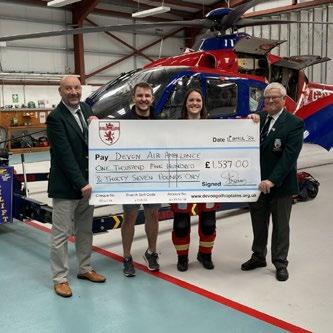
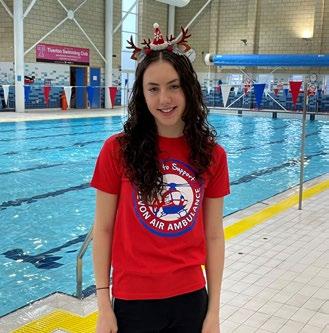
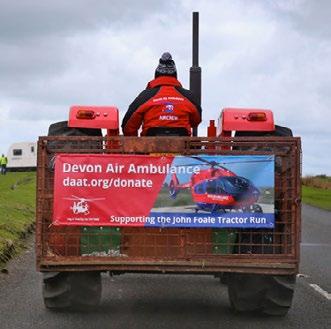
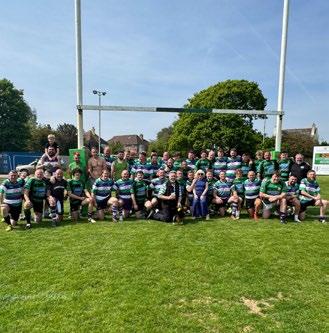
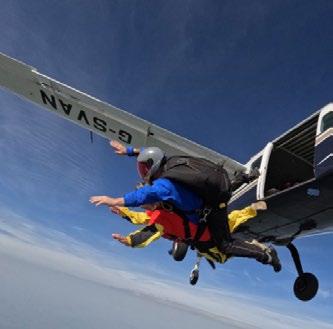
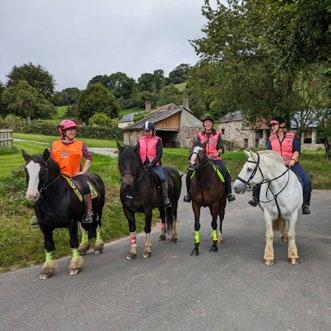
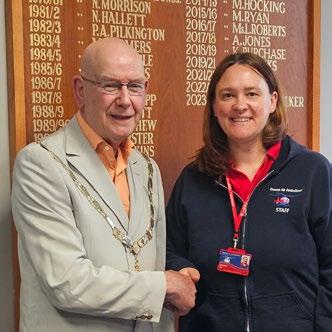
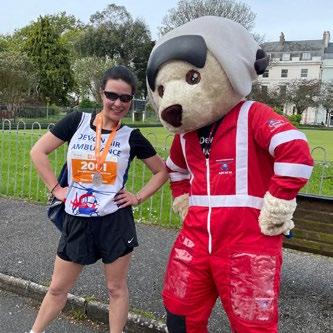
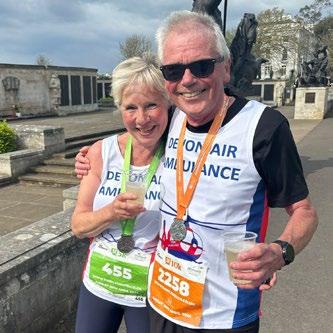
2023-2024
£73,000 of the expenditure on charitable activities in 2024 related to restricted expenditure (2023: £68,000).
During the year 42 employees were paid £60,000 or more (2023: 38, 4 in the Trust and 34 in the Trading Company), 5 in the Trust and 37 in the Trading Company.
The numbers of staff receiving emoluments, which include pension contributions, in the following bands are as follows:
During the year, termination payments totaling £66,222 were made to 4 employees. A pension scheme compliant with the auto-enrolment legislation was set up when it became applicable to the Trust in October 2015. The Trust pays a 6% contribution and the employee a minimum 1% contribution which increased to 2% in October 2016, unless the individual has opted out of the scheme. The Group Personal Pension provider is Royal London, and during the year a total of £286,901 (2023 - £248,932) was paid into the Scheme by the Trust and £131,424 (2023 - £104,505) by the employees. A balance of £35,474 (2023 - £30,132) was due to the Scheme at the end of the year.
The Trust made employers contributions into one SIPP totalling £6,866 (2023 - £6,477).
Clinical staff employed by the Trading Company are part of the NHS scheme, and a total of £266,901 (2023: £224,613) was paid into the Scheme by the Trust and £225,520 (2023: £193,765) by the employees during the year. The year-end balance payable to the NHS scheme was £40,237 (2023: £35,600).
b) Trustee Remuneration and Expenses
During the year the Charity Trustees received no (2023: none) remuneration or expenses from the Trust or its subsidiary.
During the year the charity paid indemnity insurance totalling £6,303 (2023 - £7,059).
c) Cost of Key Management Personnel
The key management personnel of the parent Trust comprise the trustees and the Senior Leadership Team. The total employee benefits of the key management personnel of the Trust were £415,083 (2023: £352,107).
The key management personnel of the Group comprise the key management personnel of the Trust, the Safety Manager, the Airworthiness Manager, the Licensed Engineer, the Lead Consultant and Clinical Lead. The total employee benefits of the key management personnel of the Group were £1,140,990 (2023: £1,000,258).
2023-2024
The average monthly head count was 174 staff (2023: 158) and the average monthly number of full-time equivalent employees during the year were as follows.
By the end of 2024 we had 608 (2023: 691) registered volunteers.
Nicola Steevenson is a non-executive Director of the trading company and has also been employed by the Trading Company through Human Performance Solutions to carry out Crew Resource Management training in 2023. In 2023 payments of £400 were made through payroll. There were no payments in 2024.
A review of our digital capabilities in 2023 was contracted with Cosmic, a trading name of Project Cosmic. Trustee Julie Hawker is the joint CEO and a Director of Project Cosmic. The cost of this work was £26,500 and the work was awarded to Cosmic following a tender process. Julie Hawker was not involved in this tender process for either Devon Air Ambulance or Cosmic, is not part of the steering group which oversees the project and has temporarily stepped back from her role on the Digital & Technological Committee while the project is carried out. Following this work Julie has returned to the committee in the year ahead of completing her second term as trustee in March 2025. Cosmic have also provided work through a government funded scheme to provide training to the DAA employees during the year. In 2024 Cosmic assisted with the recruitment of our Digital Lead by reviewing the Job Description and assisting with interviewing and selection. Cosmic invoiced £2,810 for this work.
During the year, the company had several intercompany transactions with its subsidiary, Devon Air Ambulance Trading Company. These included purchases of services for the provision of Air Ambulance Activities with a total value of £10,052,099 (prior year: £9,190,474) and sales of Management Charges to the Trading Company with a total value of £486,000 (prior year: £486,000).
At year end, the Trust had an outstanding balance of £571,656 (prior year: £390,961) owed to the Devon Air Ambulance Trading company. The charity charged the subsidiary intercompany loan interest of £507,058 (prior year: £506,465). The outstanding intercompany loan account balance owed to the Trust at the end of the year was £6,582,322 (prior year: £7,562,186).
The Trading Company made a gift aid donation of £480,00 during the year to the Trust (prior year: £830,000).
The company is a registered Charity and is not subject to corporation tax.
The charity owns the entire issued share capital of 2 ordinary shares of £1 each of Devon Air Ambulance Trading Company Limited, incorporated in England & Wales (Company number 3876276). Devon Air Ambulance Trading Company Limited provides helicopter services to the charity.
The assets and liabilities of the subsidiary were:
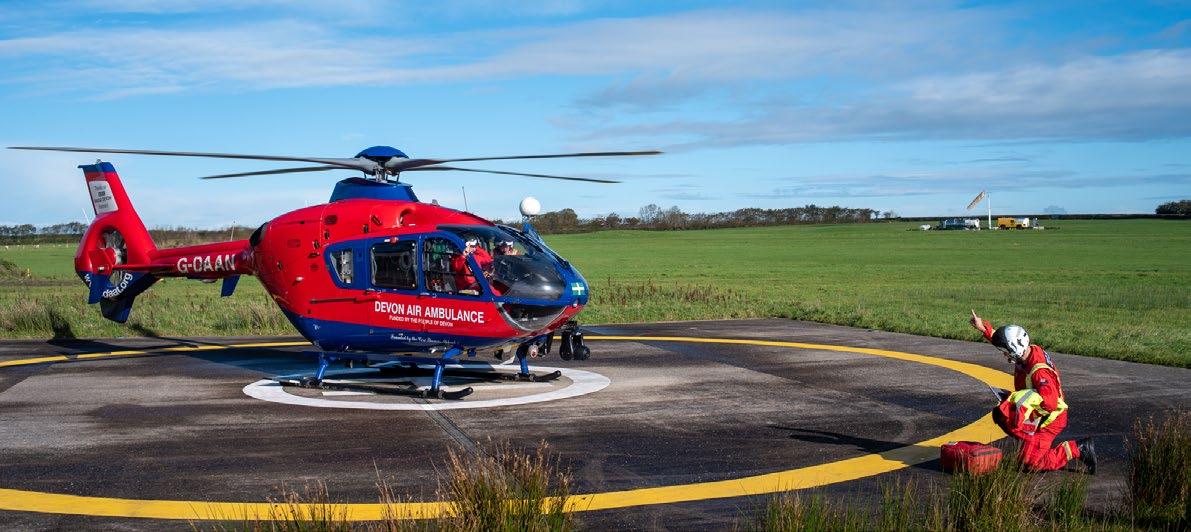
†Description, nature and purpose of designated funds - Helicopter Maintenance : This balance is calculated as the estimated costs of a severe but realistic repair scenario. - New Airbase: The expected cost of building a new operations centre, less the expected funds that can be raised in relation to it. - General: The available reserves after allowing for all designations.
‡Description, nature and purpose of restricted funds - County Air Ambulance: County Air Ambulance provided funding of £95,000 in the 2023 towards two critical care cars which were purchased and fitted out by the Charity. This fund is being decreased by the associated depreciation charge.
Health Education England - Health Education England have provided a grant to participate in simulation training with hospital staff.
DHSC – Clinical Cars - The Department of Health and Social Care have provided a grant of £226,000 towards the purchase and fitout of two clinical cars. These have been purchased and the reserve is being reduced as the assets are depreciated.
Christmas campaign for ventilators - A campaign was launched to raise £25,000 to fund a ventilator. This target was exceeded and the additional funds will go towards an additional ventilator.
The Norman Trust - The Norman Trust donated £1,200 to fund the purchase of a new syringe driver.
Vision Zero South West - this grant was provided by Vision Zero South West to support the work being completed by the Post Collision Centre.
EXIT - this grant was also granted to support the work of the Post Collision Centre.
THET - this grant was also granted to support the work of the Post Collision Centre.
20. ANALYSIS OF NET ASSETS
Life President
Ann Ralli
Patrons
Mary King MBE
Lady Penny Mountbatten
Jennie Bond
David FitzGerald
Adam Isaac
Sam Hill
Trustees who served during the year
William Matthewman (Chair)
Julie Hawker (Vice Chair)
Eleanor Adams (Treasurer)
Victoria Burr
Anthony Cramp
Richard Davidson
Dr Ross Hemingway
Ann Holman (Chair )
Darrell Mann
David Nicolson
Vicky Smiley (Chair )
Mark Williams (Chair )
Trustees appointed in 2025
Ryan Bebbington (May)
Oliver Dismore (May)
Ian Fortune (Apr)
Jillian Nye (May)
Helen Pennack (Apr)
Becky Smith (Apr)
Nicola Steevenson (May)
Committees served
Financial Growth & Sustainability Committee
People, Talent & Culture Committee
Digital & Environmental Committee
DAATCL Board
Audit Committee
Operations Governance
Senior Leadership Team
Heléna Holt, Chief Executive
Greg Allen, Chief Executive
Martin Bell, Transformation Director
Matthew Bell, Public Engagement Director
Nigel Hare, Executive Director (resigned May 2024)
David Hawes, Corporate Services Director & Accountable Manager
Steve Rush, Flight Operations Director (resigned during 2024)
Principal Address and Registered Office
Devon Air Ambulance Trust
Unit 5 Sandpiper Court
Harrington Lane
Exeter EX4 8NS
Bankers
HSBC Bank plc
250 High Street
Exeter EX4 3PZ
Solicitors
Foot Anstey LLP
Senate Court
Southernhay Gardens
Exeter EX1 1NT
Chartered Accountants & Statutory Auditors
Crowe U.K. LLP
4th Floor
St James House
St James Square
Cheltenham GL50 3PR
Investment Manager
Investec Wealth & Investment Management
30 Gresham Street
London
EC2V 7QN
Statutory Notice
The financial statements comply with the Charities Act 2011, the Companies Act 2006, the Memorandum and Articles of Association, and Accounting and Reporting by Charities: Statement of Recommended Practice application to charities preparing their accounts in accordance with the Financial Reporting Standard applicable in the UK and Republic of Ireland (FRS 102) (effective 1 January 2019).
Images DAAT expresses its gratitude to all supporters and photographers that have supplied free to use images to the charity and acknowledges copyright in their use.
© All rights reserved. No part of this report may be reproduced or used in any form without prior permission of the publisher.
